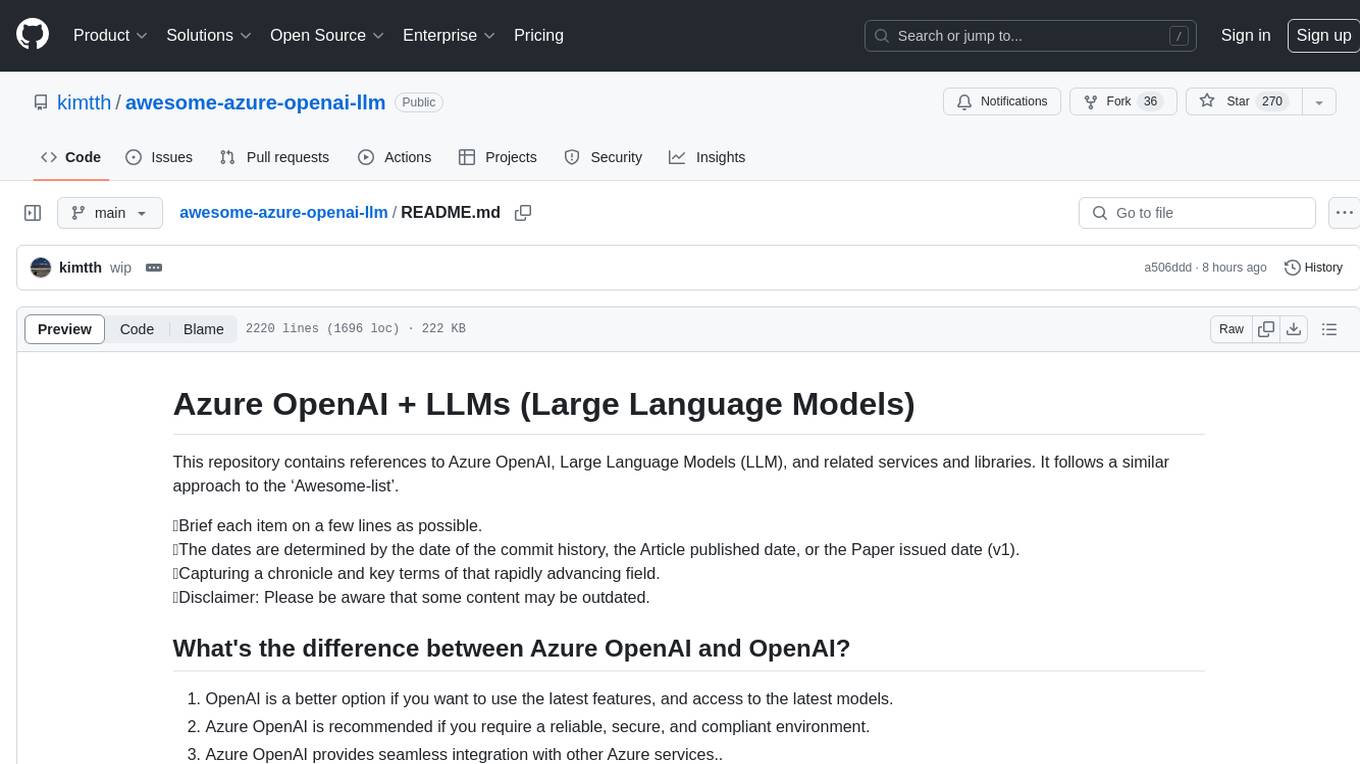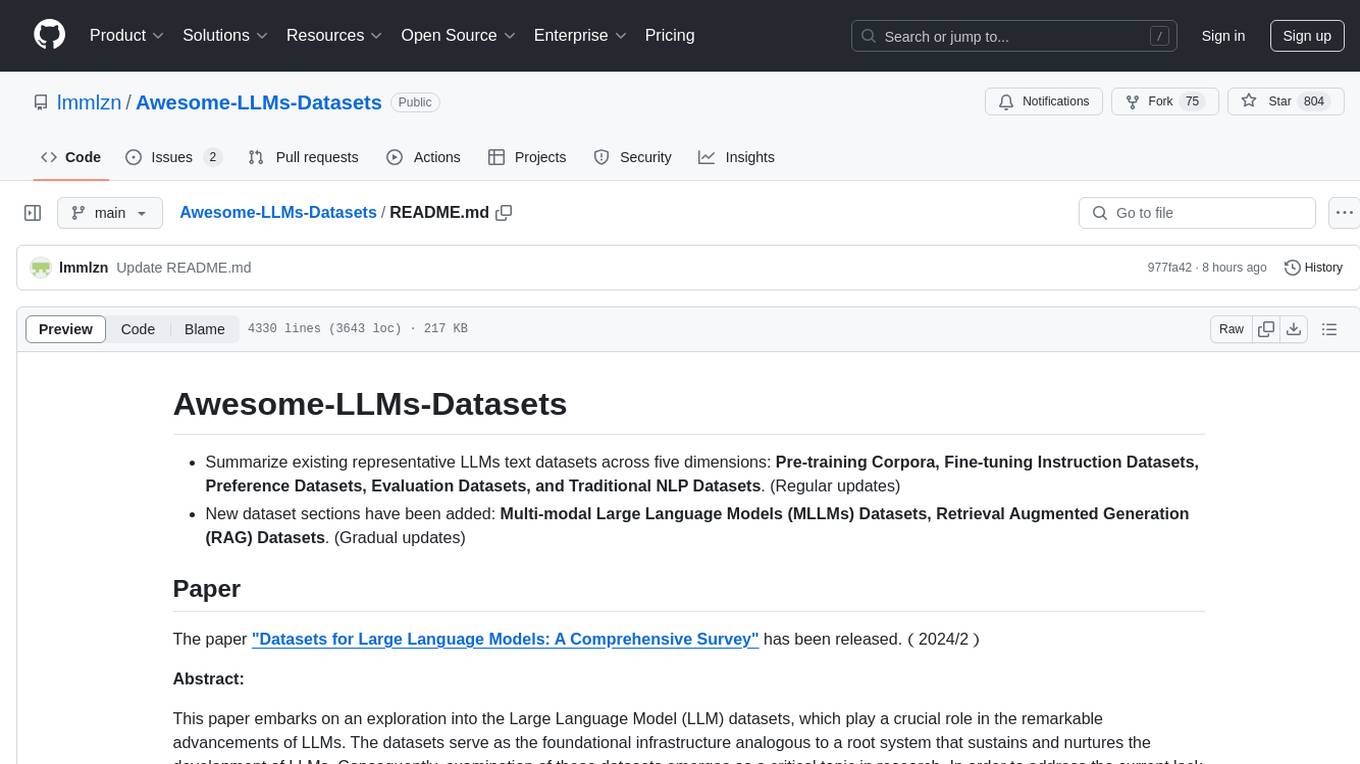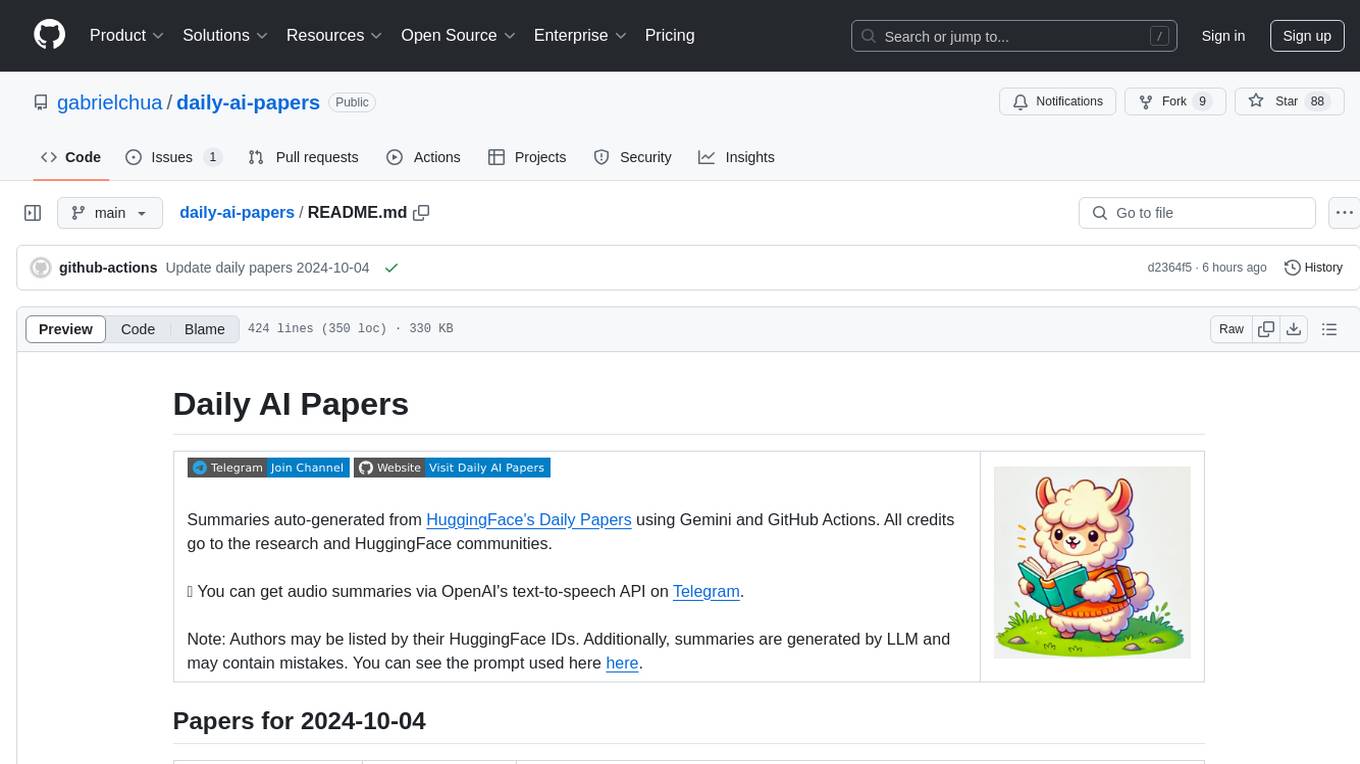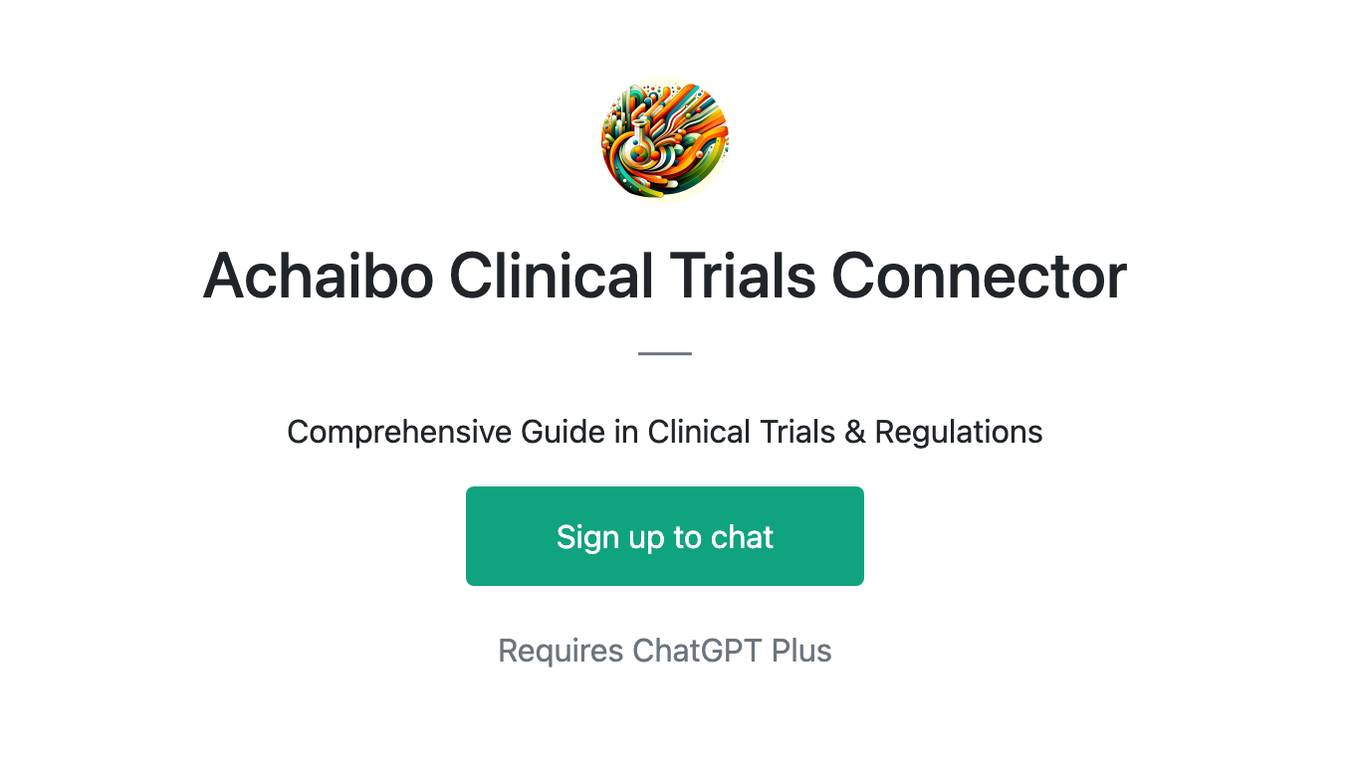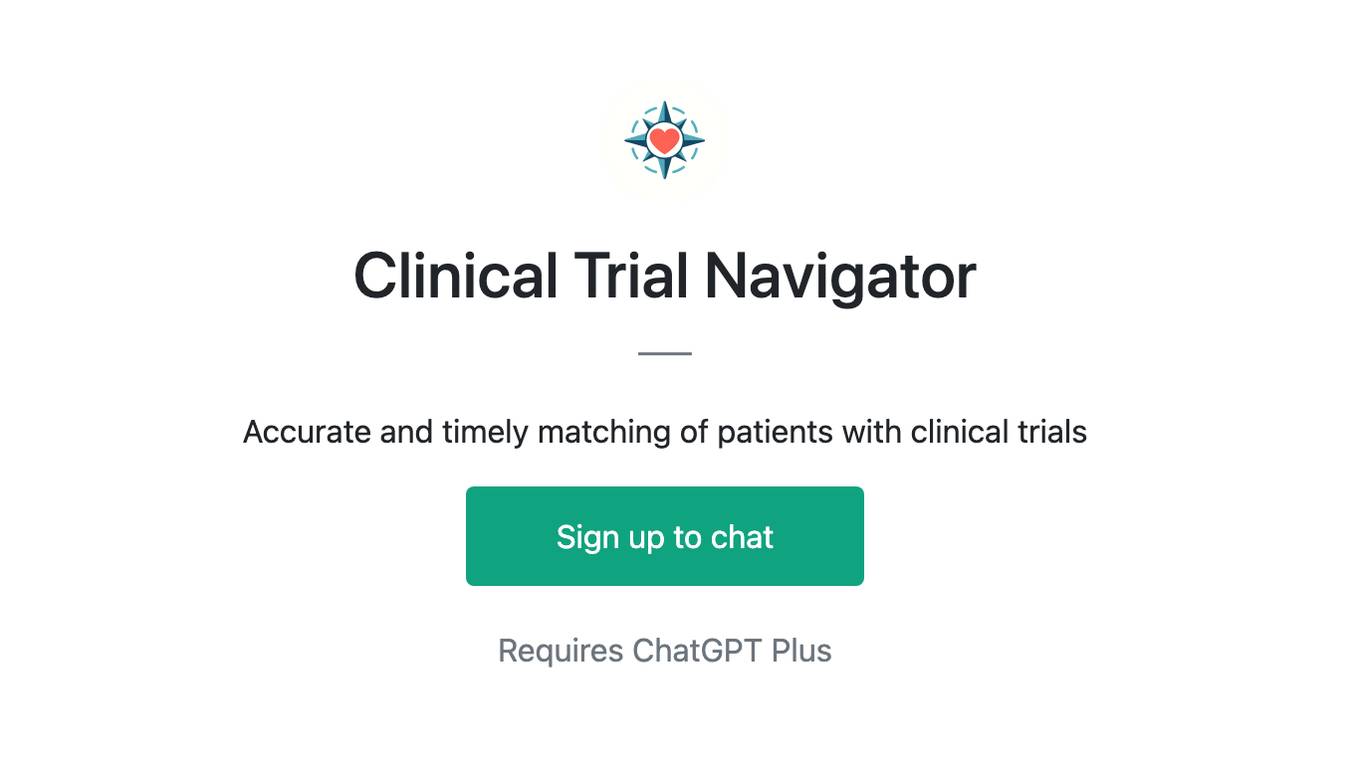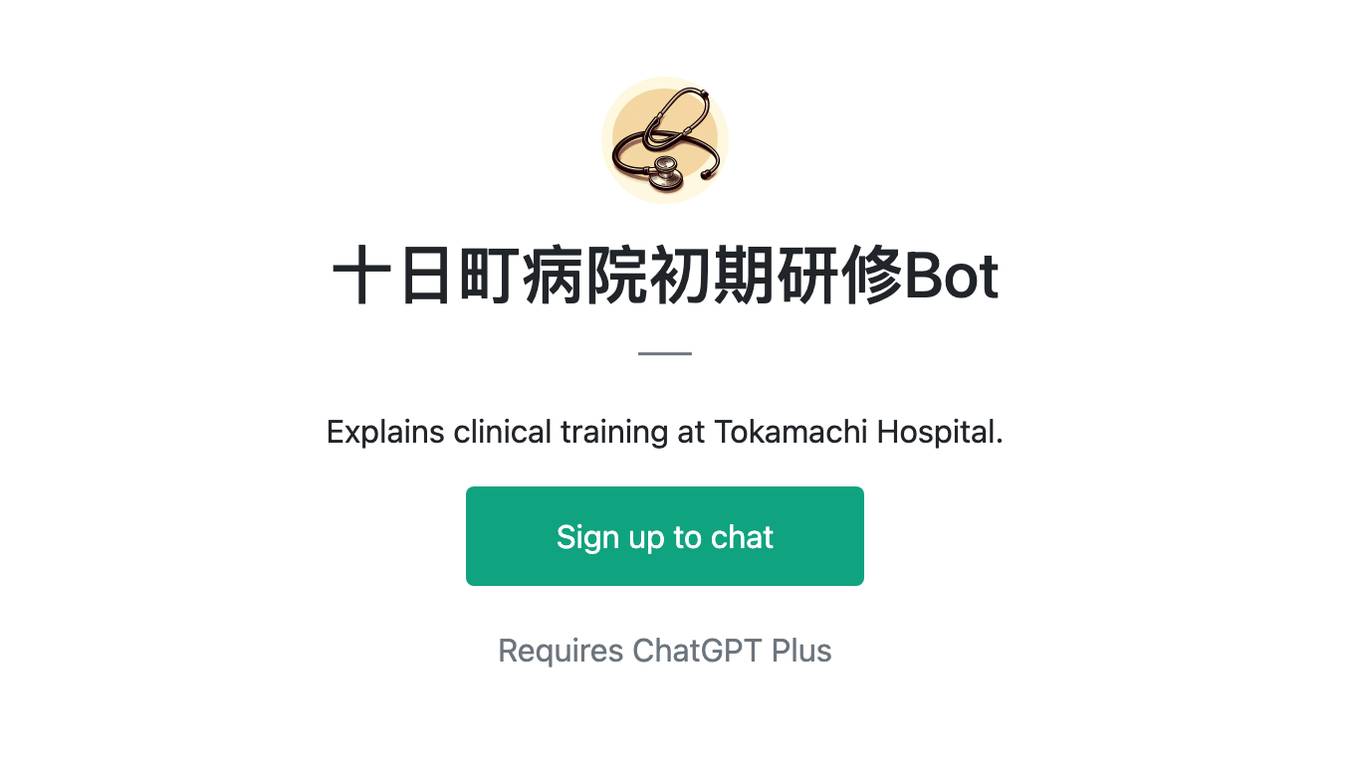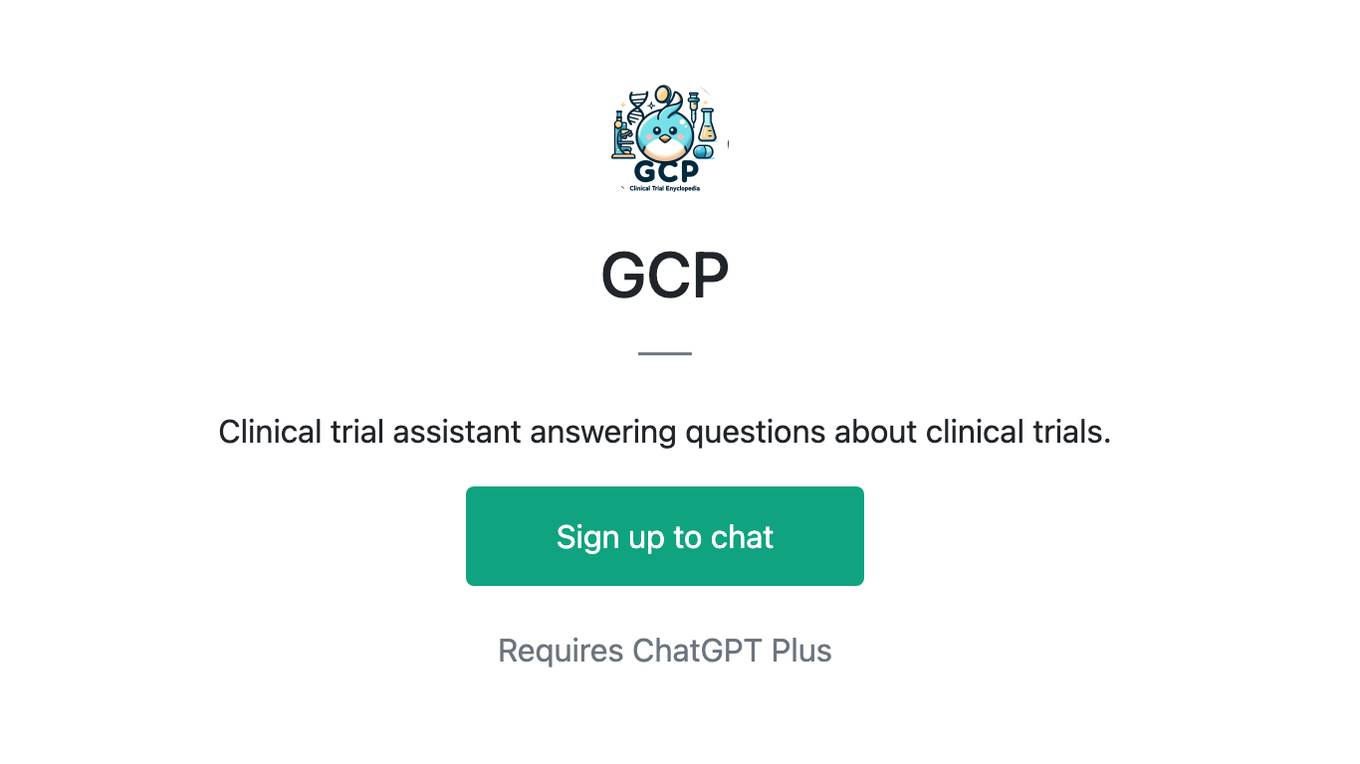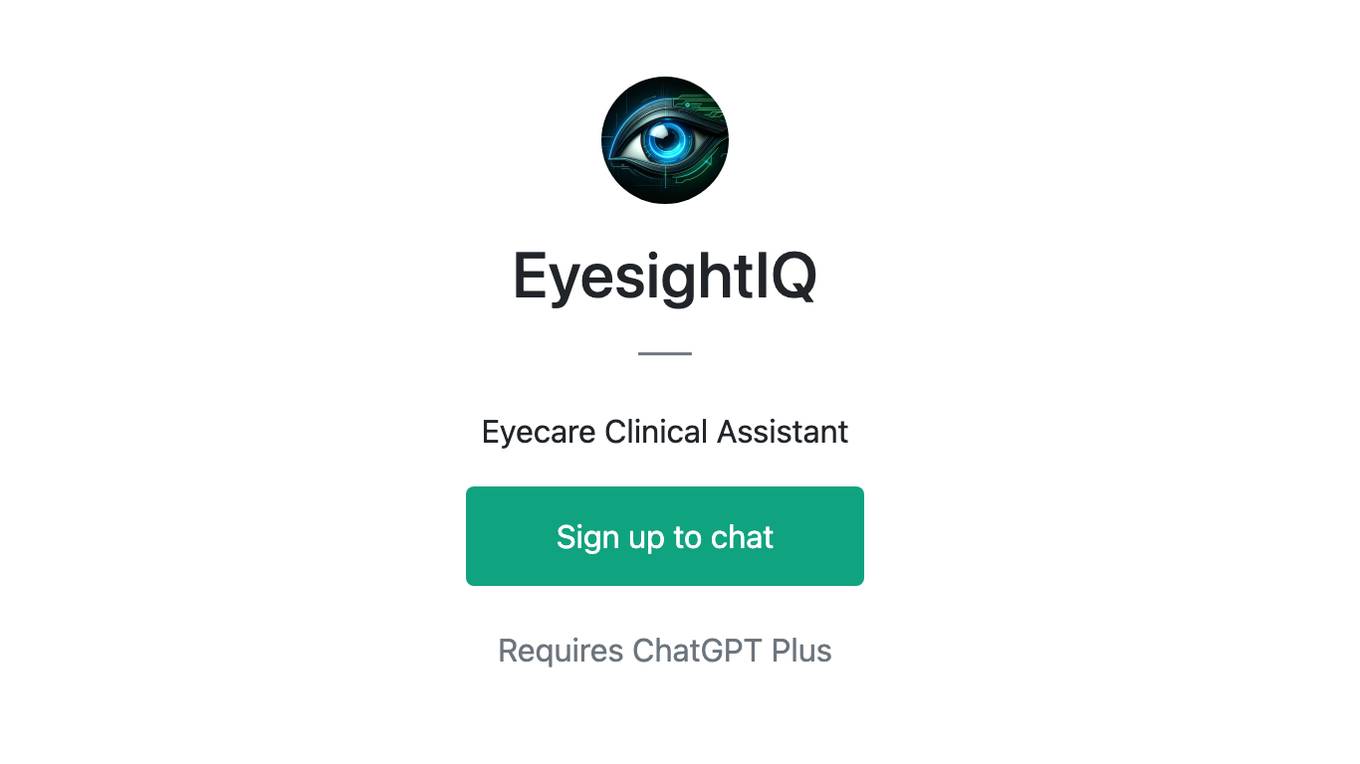Best AI tools for< Clinical Leader >
Infographic
20 - AI tool Sites

CareFlick
CareFlick is an AI-powered senior living software platform designed to empower caregivers in managing day-to-day caregiving tasks efficiently. It offers personalized recommendations, insights, and coordination tools to enhance the quality of care and streamline operations for senior care companies. CareFlick aims to reduce employee turnover, optimize operational costs, and improve resident and caregiver achievements through innovative AI technologies and smart care management features.
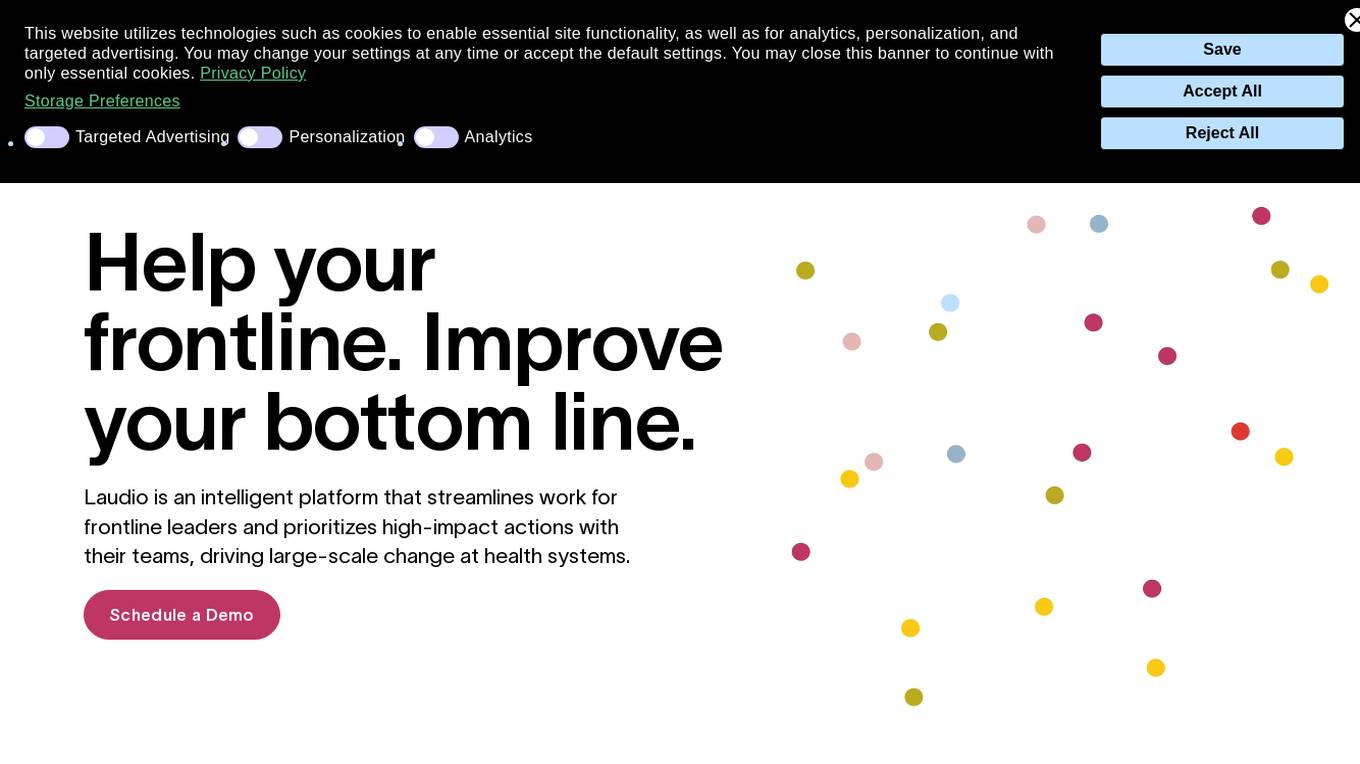
Laudio
Laudio is an intelligent platform designed to help frontline leaders in health systems streamline their work and prioritize high-impact actions with their teams. By integrating essential workflows and leveraging AI technology, Laudio aims to drive large-scale change by saving time, standardizing best practices, and improving employee engagement and patient experience.
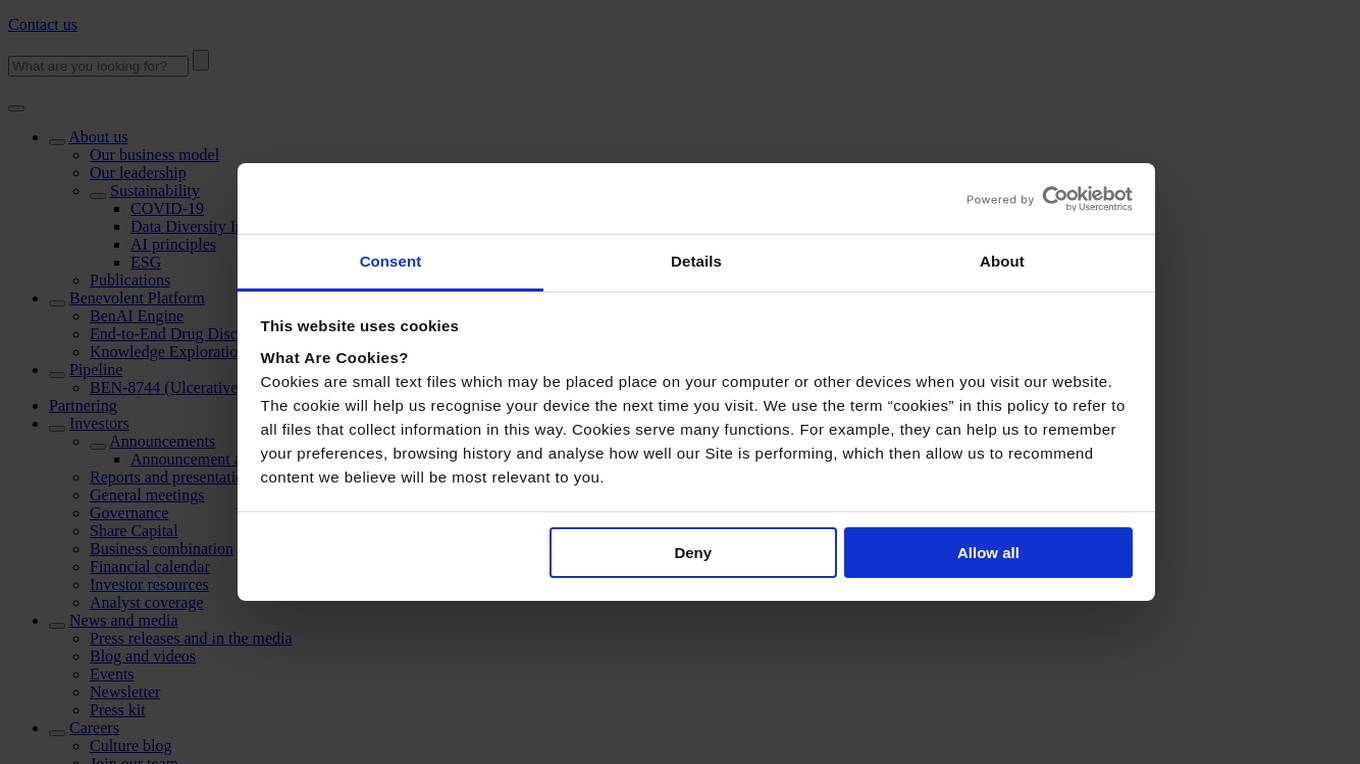
BenevolentAI
BenevolentAI is a leader in applying advanced AI to accelerate biopharma drug discovery blending science and technology with a focus on finding solutions for complex diseases. We empower both biopharmaceutical companies and our internal scientists to harness the full potential of data and AI to accelerate the next generation of scientific advances. We have built our AI-enabled drug discovery engine to drive a revolution in drug discovery. The Benevolent Platform™ unlocks the power of a vast biomedical data landscape to provide a multidimensional representation of human biology across all diseases. We believe this approach will improve the probability of clinical success, and help us deliver life-changing treatments to patients – because it matters.
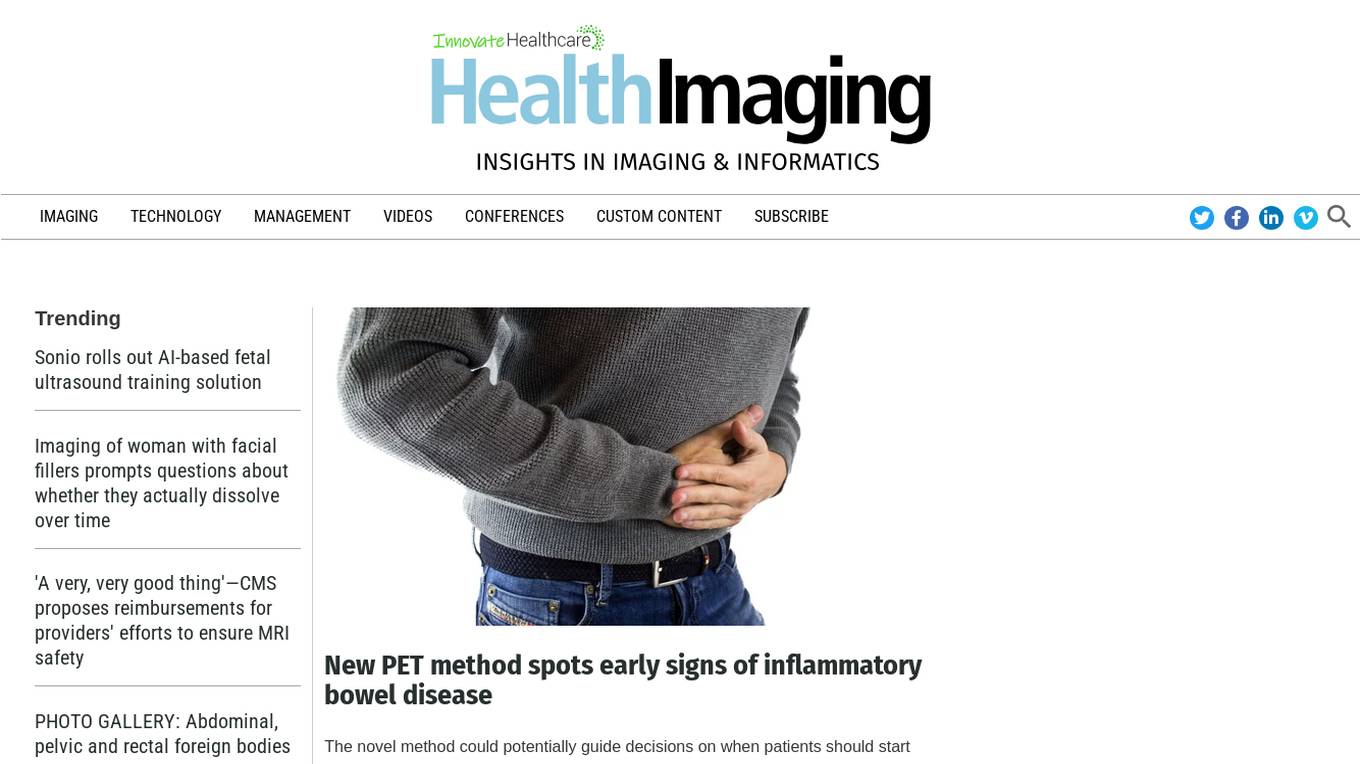
Health Imaging
Health Imaging is an AI-powered platform that focuses on providing cutting-edge solutions in medical imaging and healthcare management. The platform offers a wide range of features and tools that leverage artificial intelligence to enhance diagnostic accuracy, streamline workflows, and improve patient care. From advanced imaging technologies to AI-based training solutions, Health Imaging is at the forefront of innovation in the healthcare industry.
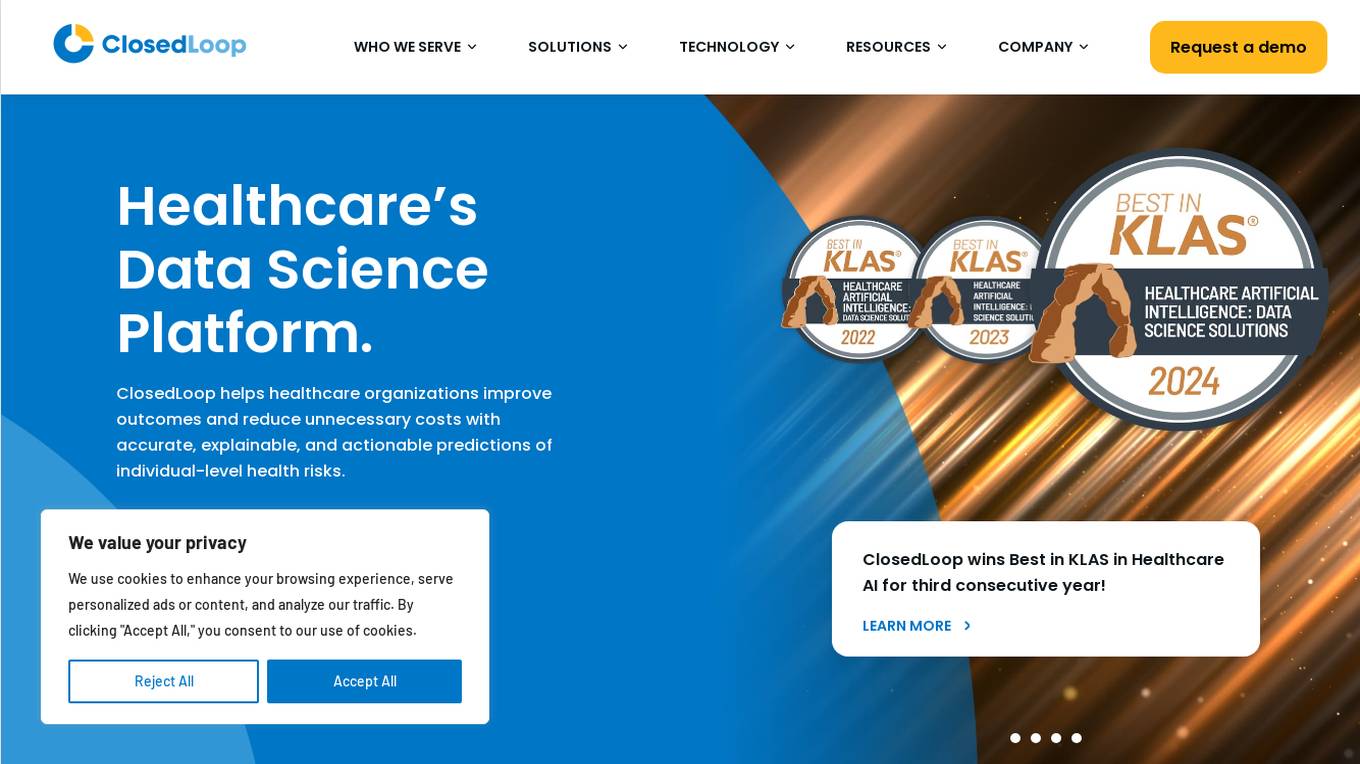
ClosedLoop
ClosedLoop is a healthcare data science platform that helps organizations improve outcomes and reduce unnecessary costs with accurate, explainable, and actionable predictions of individual-level health risks. The platform provides a comprehensive library of easily modifiable templates for healthcare-specific predictive models, machine learning (ML) features, queries, and data transformation, which accelerates time to value. ClosedLoop's AI/ML platform is designed exclusively for the data science needs of modern healthcare organizations and helps deliver measurable clinical and financial impact.
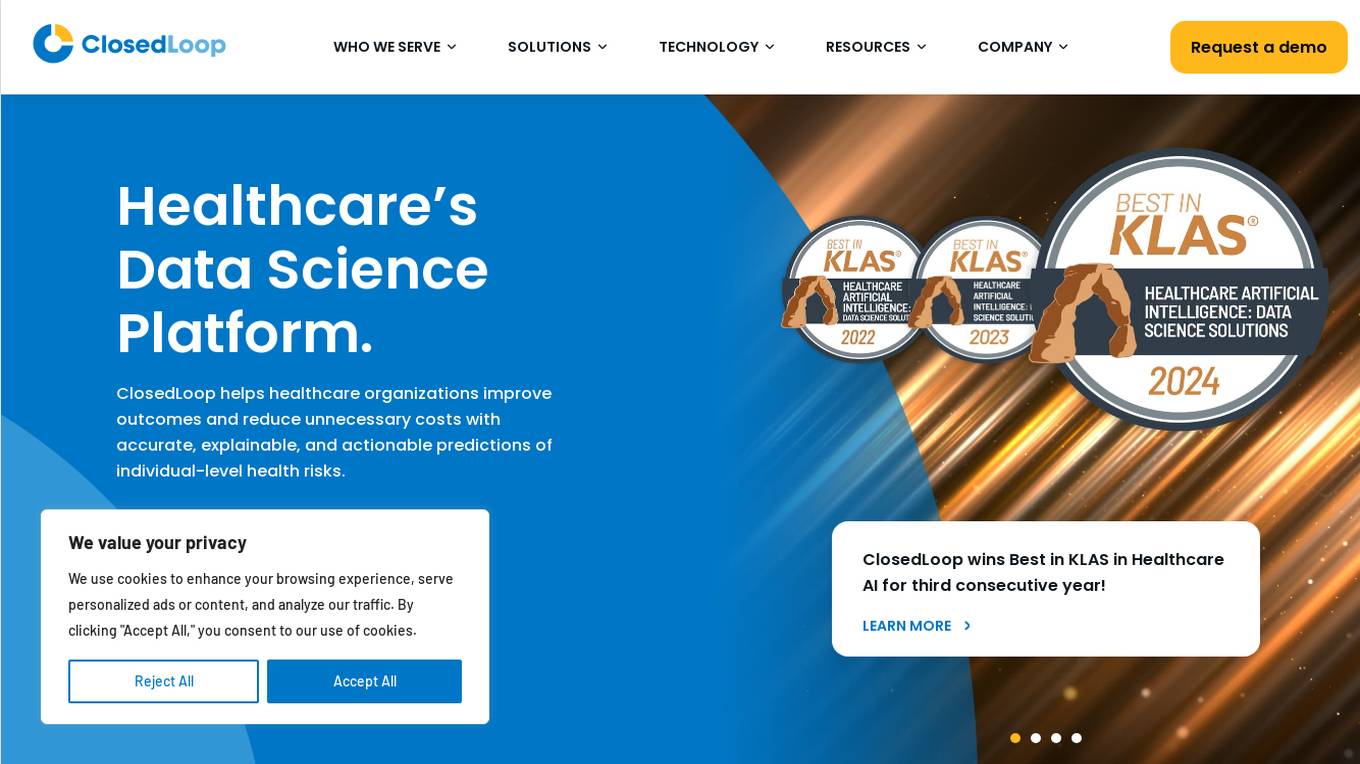
ClosedLoop
ClosedLoop is a healthcare data science platform that helps organizations improve outcomes and reduce costs by providing accurate, explainable, and actionable predictions of individual-level health risks. The platform offers predictive analytics for various healthcare sectors, data science automation, and a healthcare content library to accelerate time to value. ClosedLoop's AI/ML platform is designed exclusively for the data science needs of modern healthcare organizations, enabling proactive interventions, improved clinical outcomes, and innovative healthcare offerings.
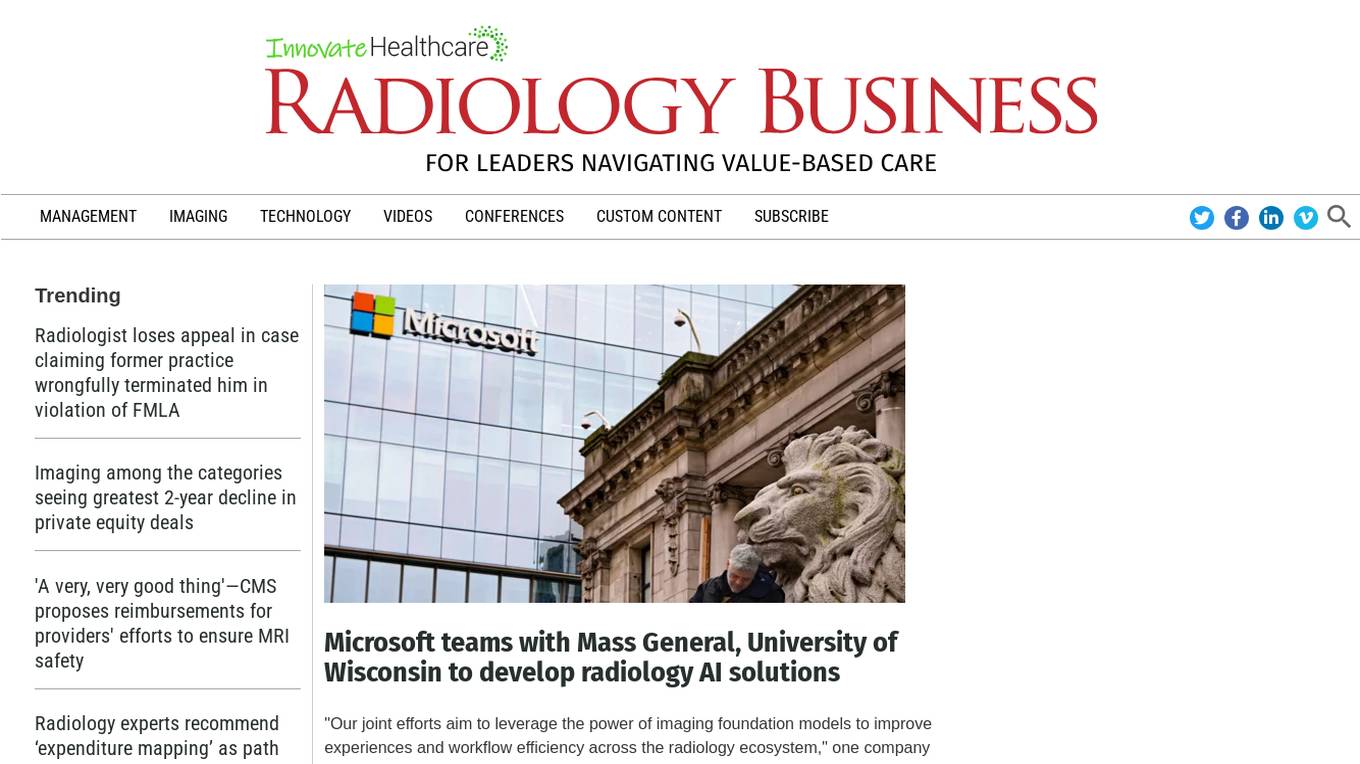
Radiology Business
Radiology Business is an AI tool designed to provide insights and solutions for professionals in the radiology field. The platform covers a wide range of topics including management, imaging, technology, and conferences. It offers news, analysis, and resources to help radiologists stay informed and make informed decisions. Radiology Business aims to leverage artificial intelligence to improve workflow efficiency and enhance the overall experience in the radiology ecosystem.
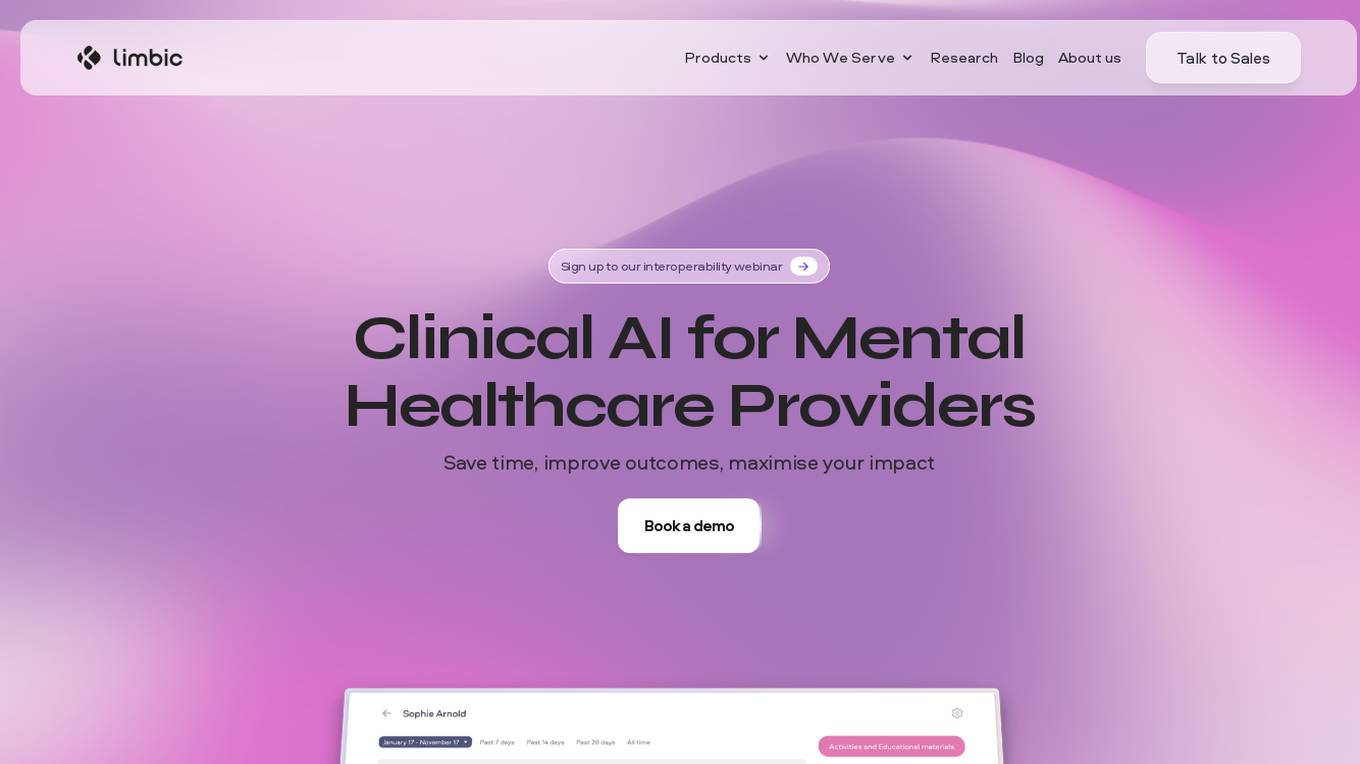
Limbic
Limbic is a clinical AI application designed for mental healthcare providers to save time, improve outcomes, and maximize impact. It offers a suite of tools developed by a team of therapists, physicians, and PhDs in computational psychiatry. Limbic is known for its evidence-based approach, safety focus, and commitment to patient care. The application leverages AI technology to enhance various aspects of the mental health pathway, from assessments to therapeutic content delivery. With a strong emphasis on patient safety and clinical accuracy, Limbic aims to support clinicians in meeting the rising demand for mental health services while improving patient outcomes and preventing burnout.
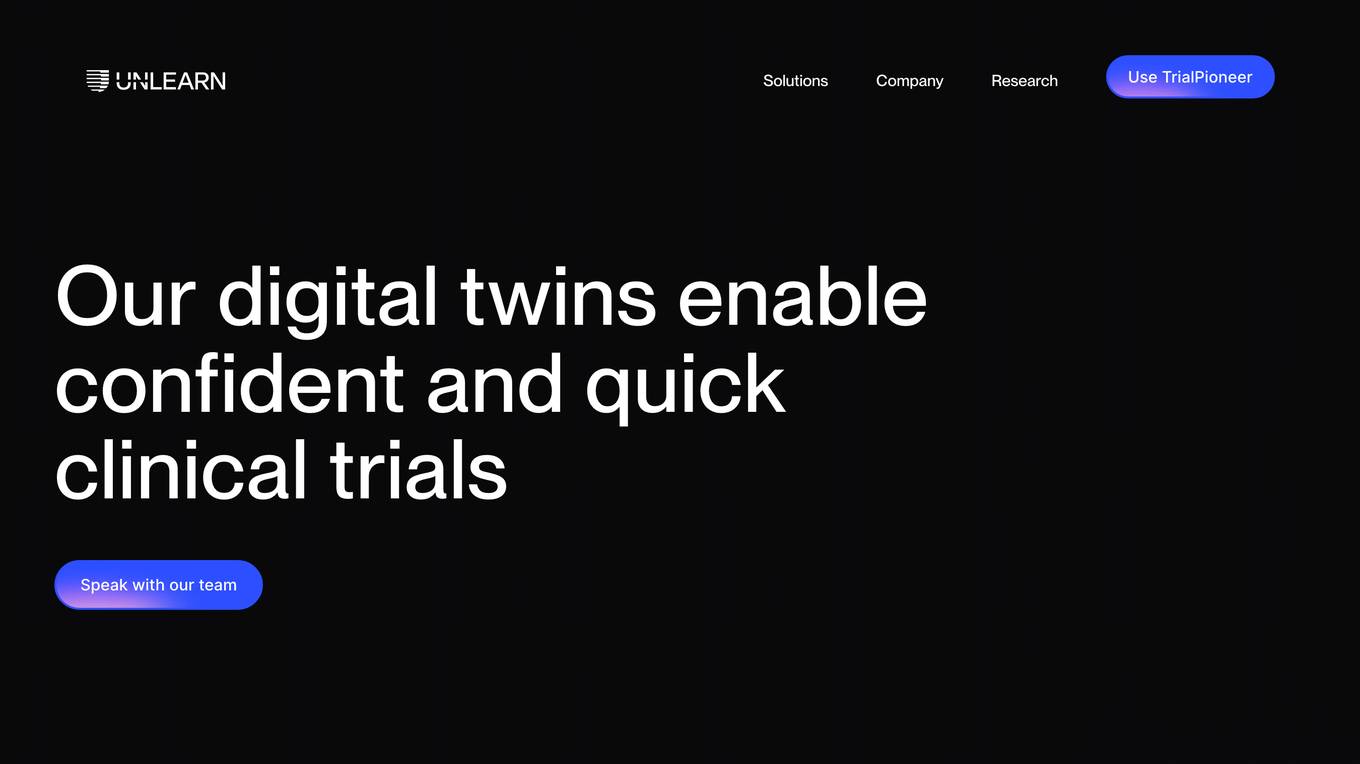
Unlearn.ai
Unlearn.ai is an AI-powered digital twins solution provider that optimizes clinical trials. Their TwinRCTs enable confident and quick clinical trials in various medical fields such as neuroscience, immunology, and metabolic diseases. By creating digital twins of patients, Unlearn.ai enhances the power and efficiency of clinical trials, attracting study participants and making confident decisions from early to late-stage studies.
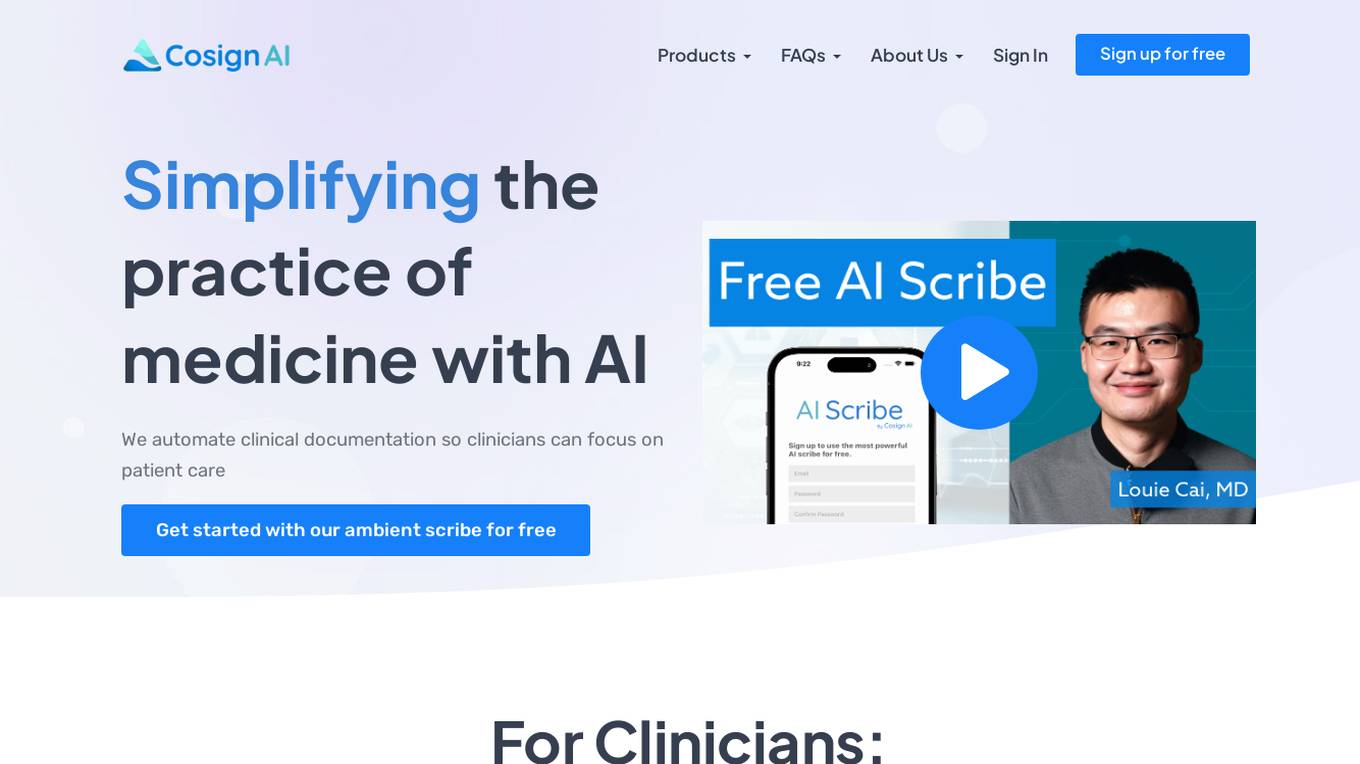
Cosign AI
Cosign AI is an AI application that optimizes clinical practices by automating clinical documentation through an ambient scribe. The tool transforms conversations and dictations into clinical notes using large language models and customizable templates. It prioritizes HIPAA compliance and data security, ensuring a secure infrastructure for storing and processing protected health information. Clinicians can save time, reduce burnout, and improve note quality with this innovative solution.
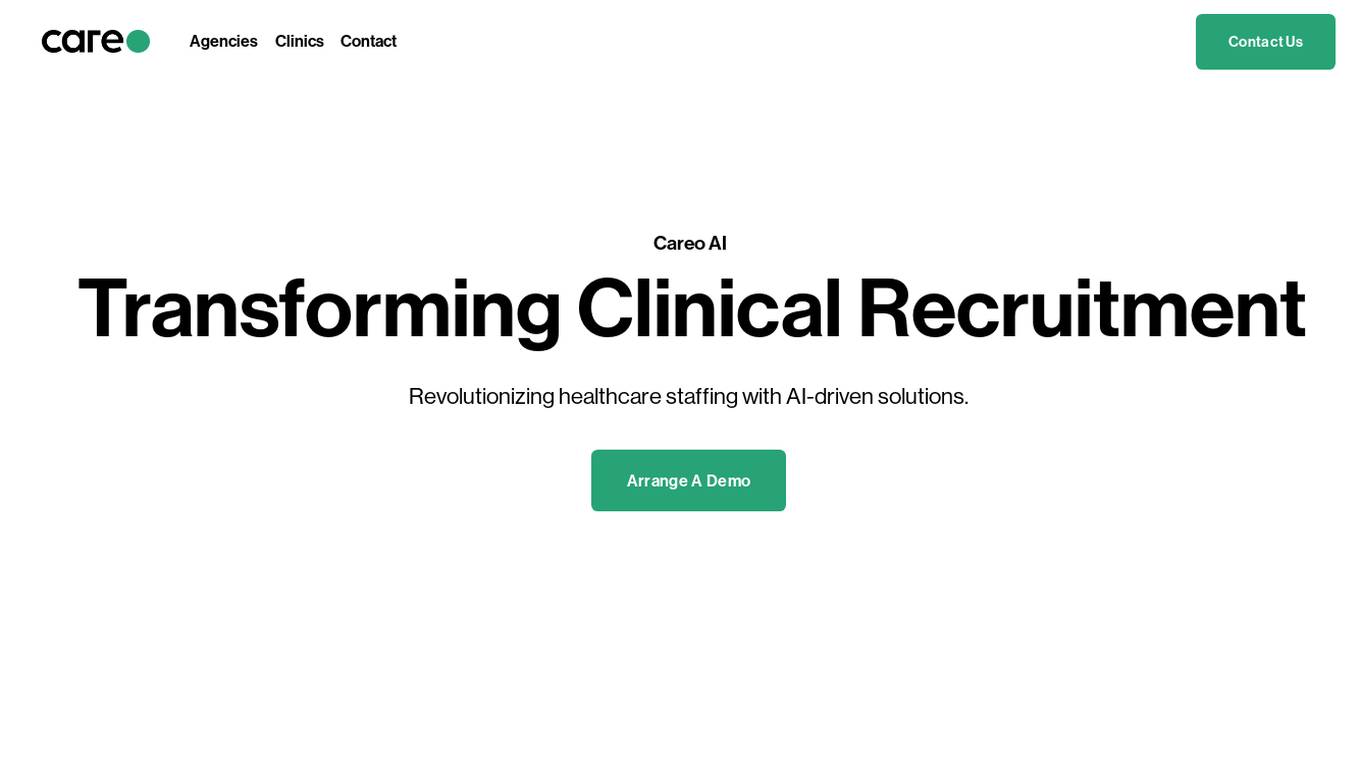
Careo AI
Careo AI is an advanced AI-driven solution that is transforming clinical recruitment and revolutionizing healthcare staffing. The platform offers cutting-edge technology to streamline candidate management, vacancy tracking, workflow automation, analytics, and reporting. It provides seamless integration with existing systems, customization, and scalability for recruitment agencies. Careo AI aims to optimize recruitment strategies and enhance productivity in the healthcare industry.
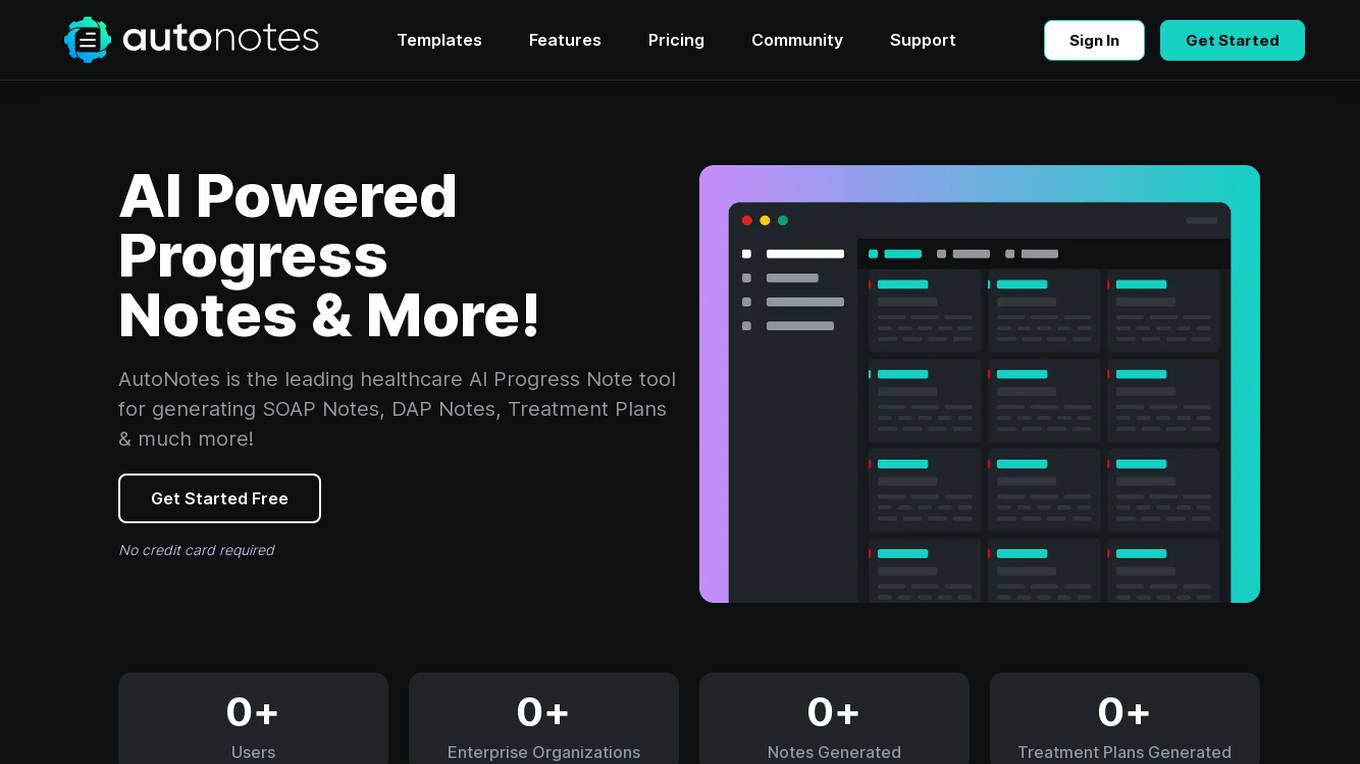
AutoNotes
AutoNotes is a leading healthcare AI Progress Note tool that offers AI-powered clinical documentation templates for generating SOAP Notes, DAP Notes, Treatment Plans, and more. It provides a user-friendly interface for therapists and healthcare professionals to create detailed and customizable clinical notes efficiently. With features like summarizing sessions, editing and downloading notes, and simple pricing plans, AutoNotes aims to streamline the documentation process in healthcare settings. The platform also offers advanced features like template customization, secure document storage, and dictation for voice-to-text conversion. Users can benefit from the platform's customization options, seamless integration with workflows, and responsive customer support.
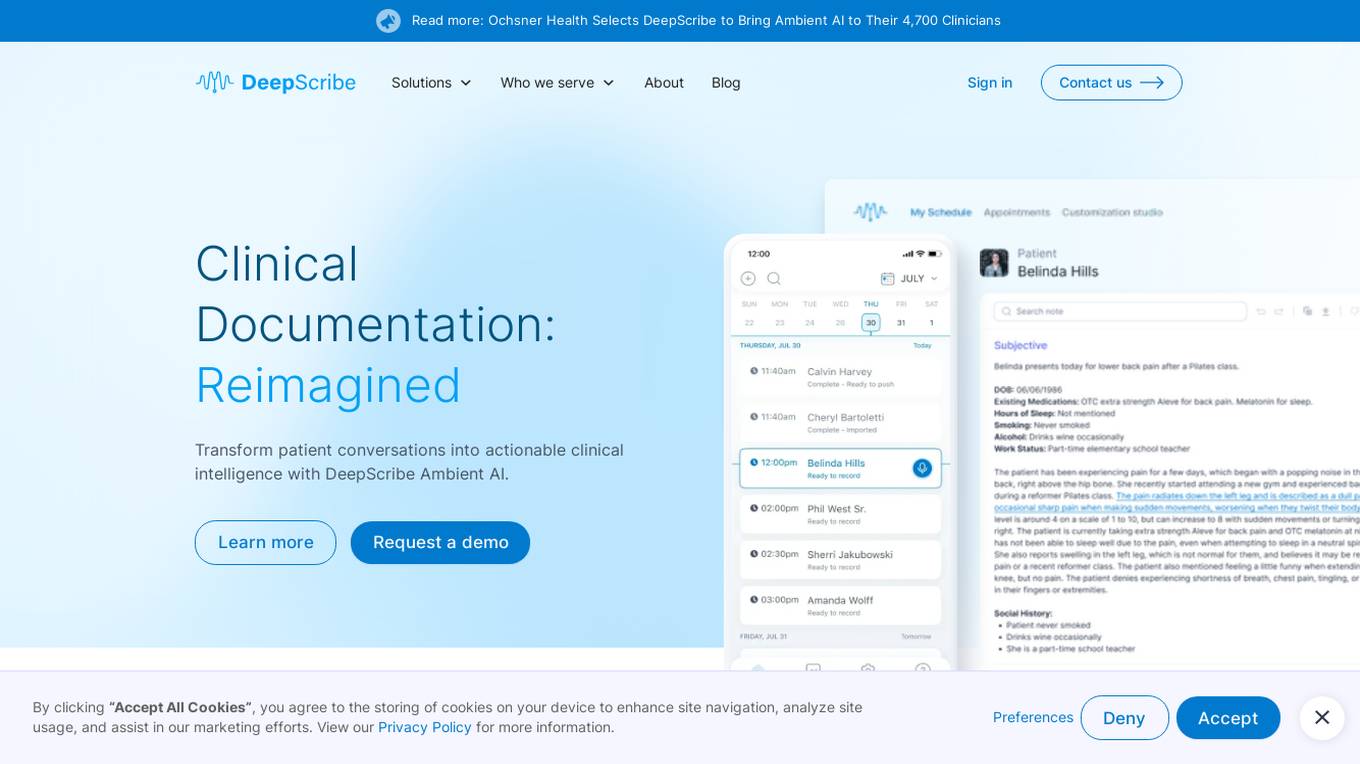
DeepScribe
DeepScribe is an AI medical scribe application that leverages advanced speech recognition technology to capture clinical conversations with extreme accuracy. It empowers clinicians and health systems with real-time AI insights, offers customization options to match provider workflows, and ensures trust and safety through features that promote AI transparency. DeepScribe is designed to save time, improve accuracy, drive adoption, and maximize revenue for doctors, hospitals, and health systems. The application is built for enterprise use, allowing users to unlock the power of AI and modernize their patient data strategy.
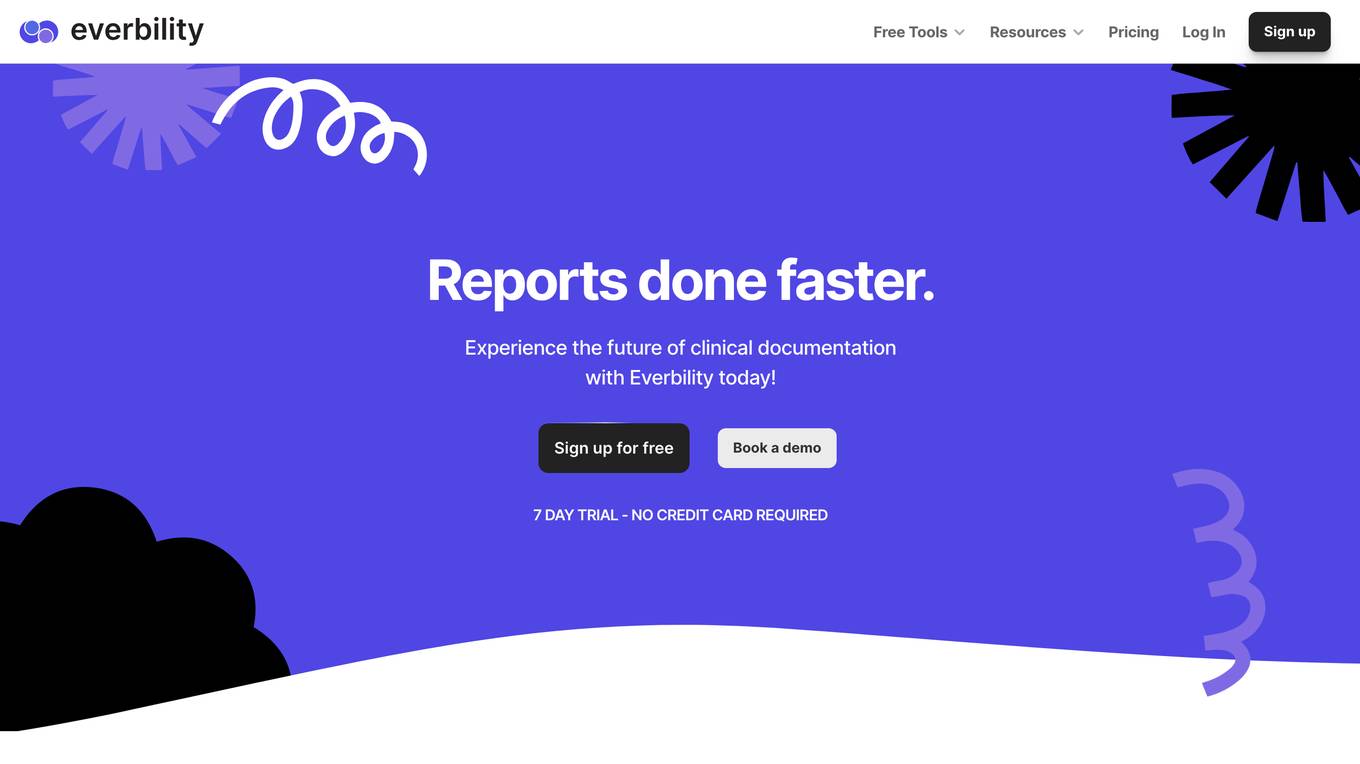
Everbility
Everbility is an AI-powered clinical documentation tool designed for Allied Health Professionals. It helps in writing reports, synthesizing client notes, brainstorming ideas, and focusing on client care. The tool saves time by generating progress notes, letters, and assessment reports, while ensuring data privacy and compliance with regulations like HIPAA and Australian Privacy Principles.
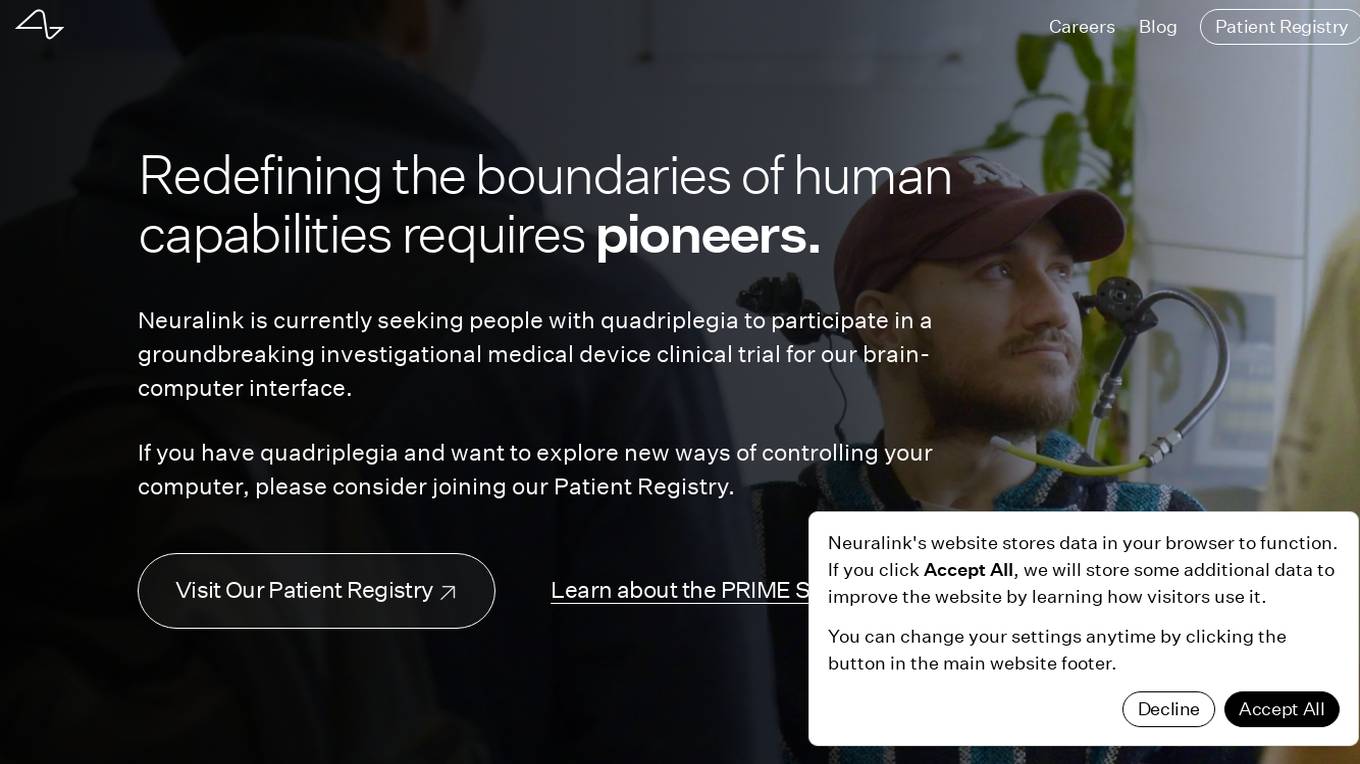
Neuralink
Neuralink is a pioneering brain-computer interface (BCI) application that aims to redefine human capabilities by creating a generalized brain interface to restore autonomy to individuals with unmet medical needs. The application focuses on developing fully implantable BCIs that allow users, particularly those with quadriplegia, to control computers and mobile devices using their thoughts. Neuralink's innovative technology includes advanced chips, biocompatible enclosures, and surgical robots for precise implantation. The application prioritizes safety, accessibility, and reliability in its engineering process, with future goals of restoring vision, motor function, and speech capabilities.
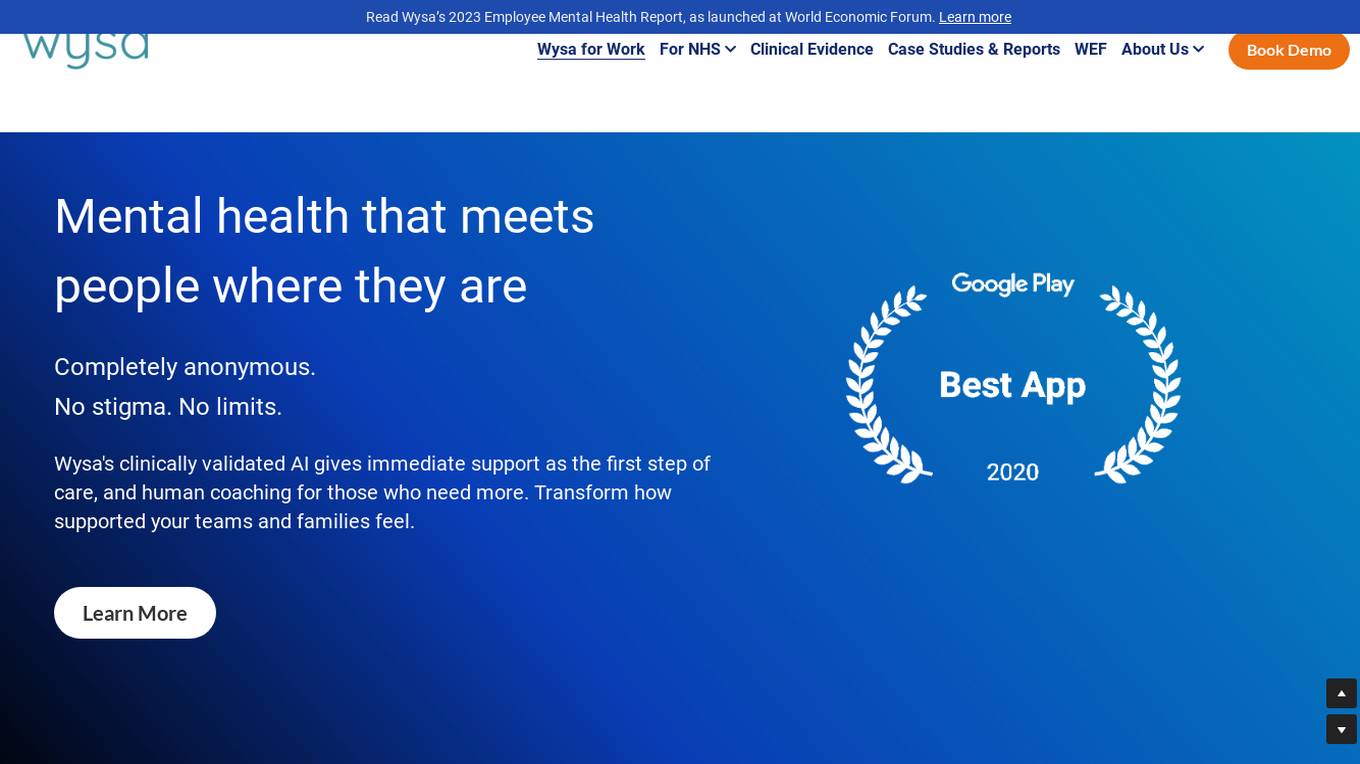
Wysa
Wysa is an AI-powered mental health application that provides immediate support through clinically validated AI chat conversations. It offers anonymous and unlimited care to help individuals work through worries, stressors, and symptoms of depression or anxiety. Wysa also provides structured programs, on-demand self-care exercises, and access to professional support for users in need. The application aims to transform how teams and families feel supported by leveraging AI technology to improve mental health outcomes globally.
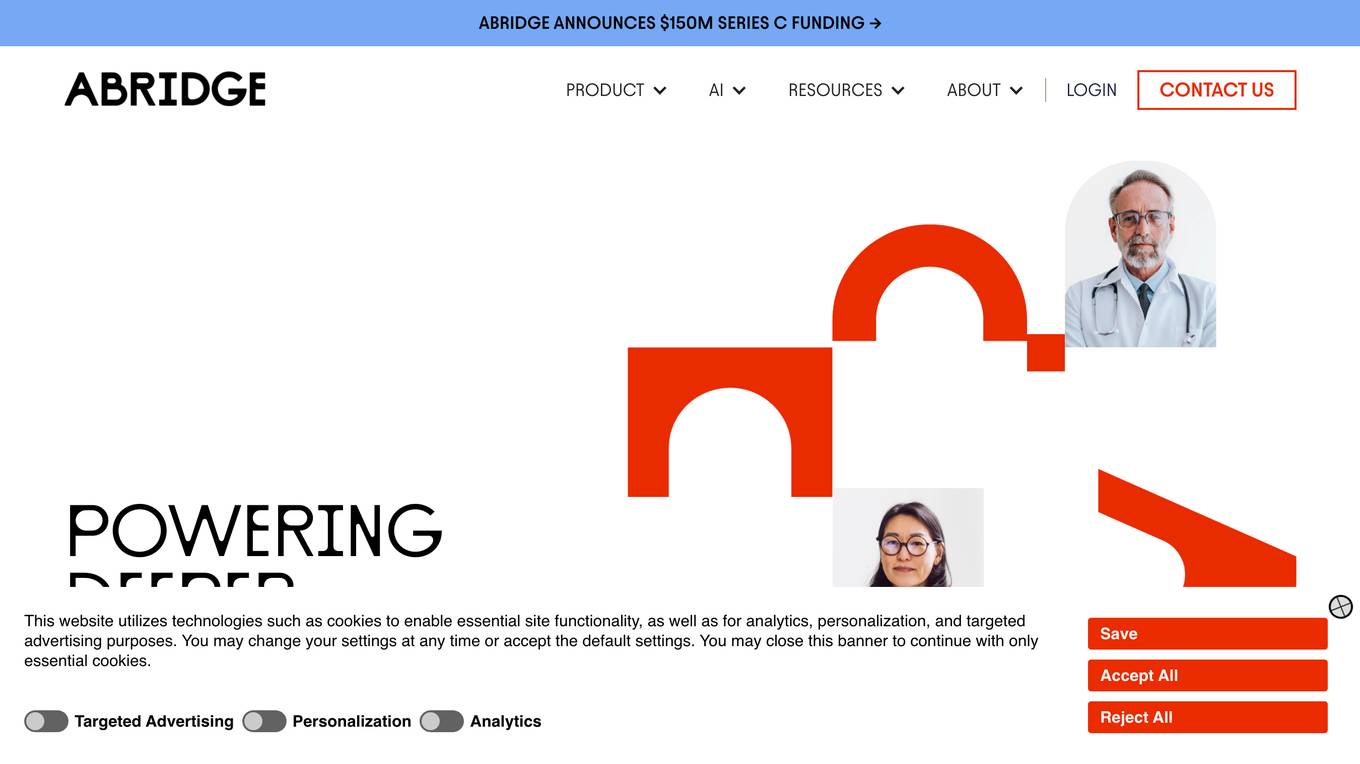
Abridge
Abridge is a generative AI platform designed for clinical conversations, integrated directly inside Epic. It transforms patient-clinician conversations into structured clinical notes in real-time, powered by advanced generative AI technology. Abridge saves hours of time-consuming documentation per clinician every month, provides clinically accurate summaries across specialties and languages, and creates highly accurate structured clinical note drafts. The platform aims to return time to healthcare teams, clarity to patients, and efficiencies to healthcare systems.
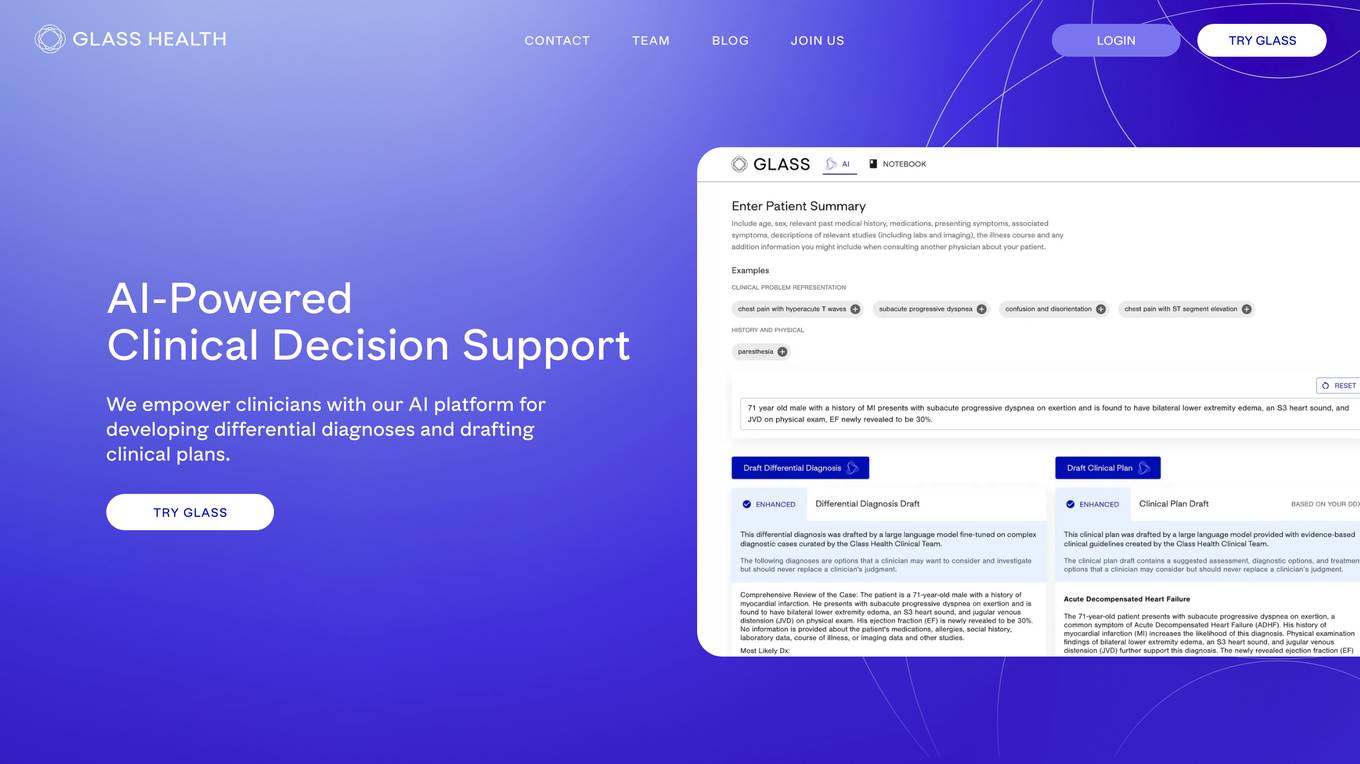
Glass Health
Glass is an AI-powered clinical decision support platform that empowers clinicians by providing differential diagnoses and drafting clinical plans based on patient summaries. The platform combines a large language model with evidence-based clinical guidelines to assist clinicians in making informed decisions. Glass Health aims to optimize the practice of medicine, improve patient care, increase diagnostic accuracy, implement evidence-based treatment, enhance medical education, eliminate burnout, accelerate health equity, and improve patient outcomes globally.
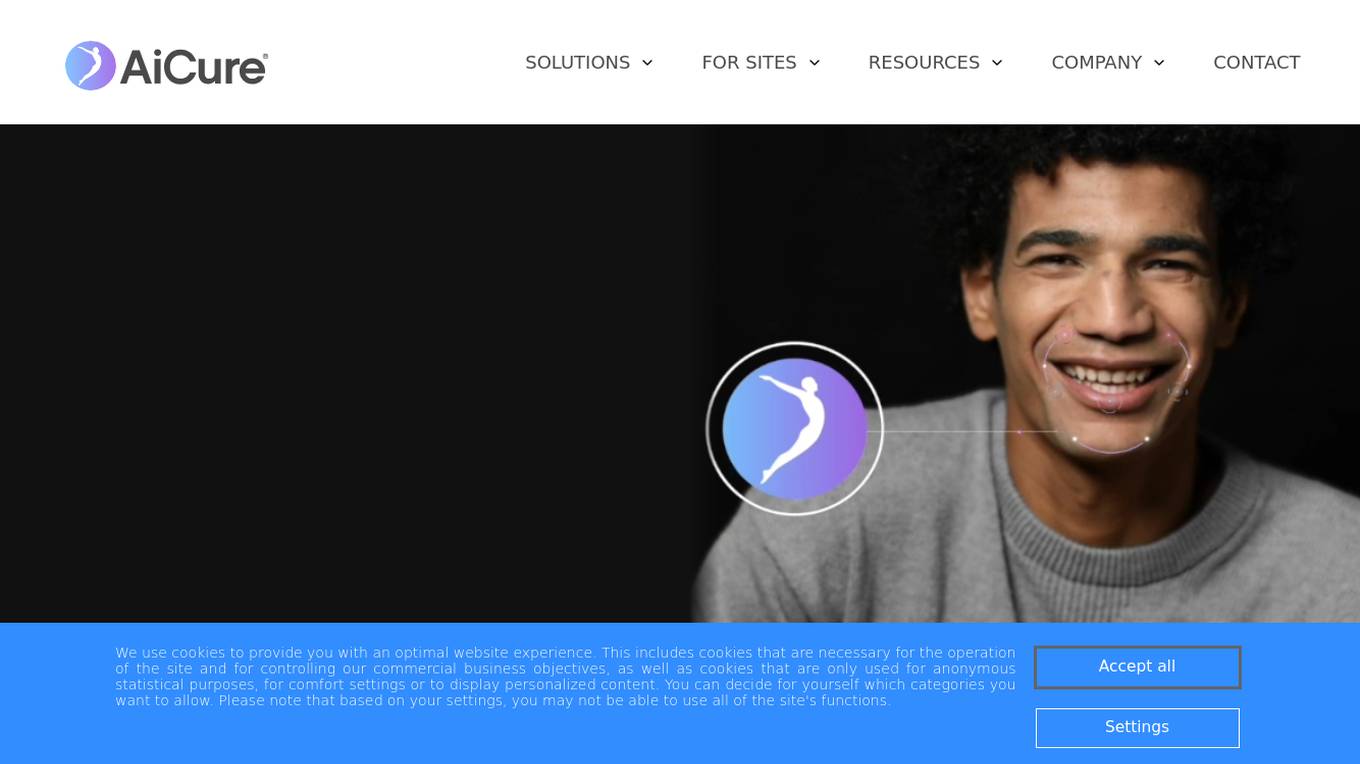
AiCure
AiCure provides a patient-centric eClinical trial management platform that enhances drug development through improved medication adherence rates, more powerful analysis and prediction of treatment response using digital biomarkers, and reduced clinical tech burden. AiCure's solutions support traditional, decentralized, or hybrid trials and offer flexibility to meet the needs of various research designs.
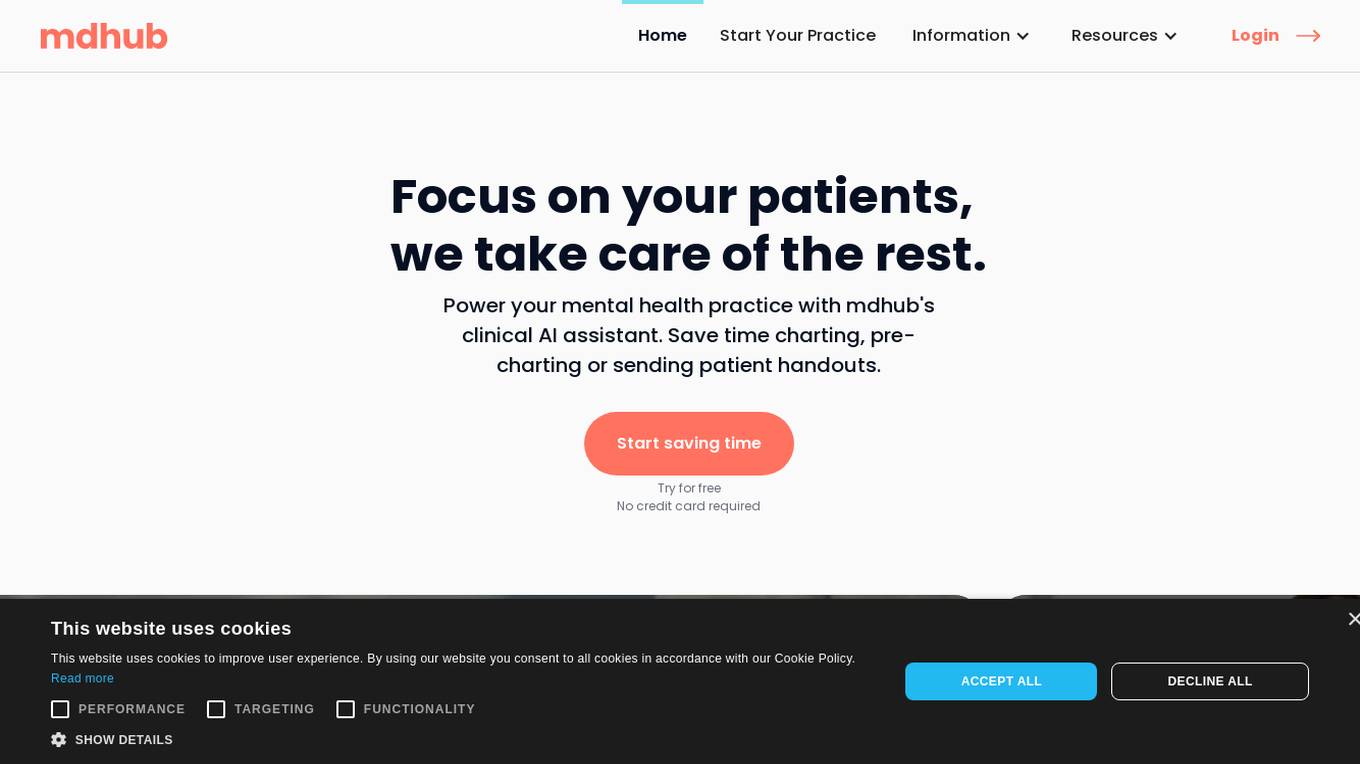
MDHub
MDHub is a clinical AI assistant designed to support behavioral health clinicians in their practice. It offers a user-friendly interface for seamless integration into workflows, time-saving features like instant audio transformation for charting, and personalized treatment plan recommendations. The application aims to enhance patient care by automating documentation tasks and improving efficiency in mental health practices.
20 - Open Source Tools
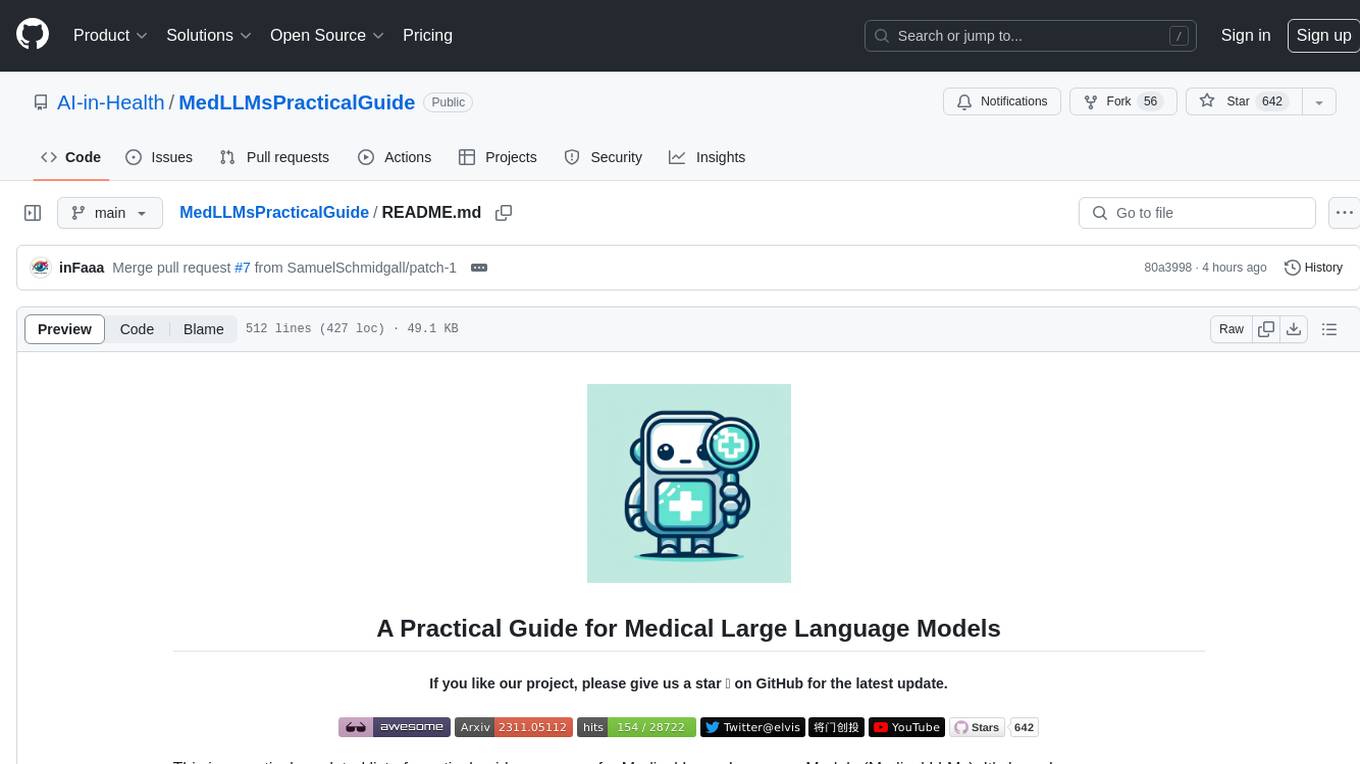
MedLLMsPracticalGuide
This repository serves as a practical guide for Medical Large Language Models (Medical LLMs) and provides resources, surveys, and tools for building, fine-tuning, and utilizing LLMs in the medical domain. It covers a wide range of topics including pre-training, fine-tuning, downstream biomedical tasks, clinical applications, challenges, future directions, and more. The repository aims to provide insights into the opportunities and challenges of LLMs in medicine and serve as a practical resource for constructing effective medical LLMs.
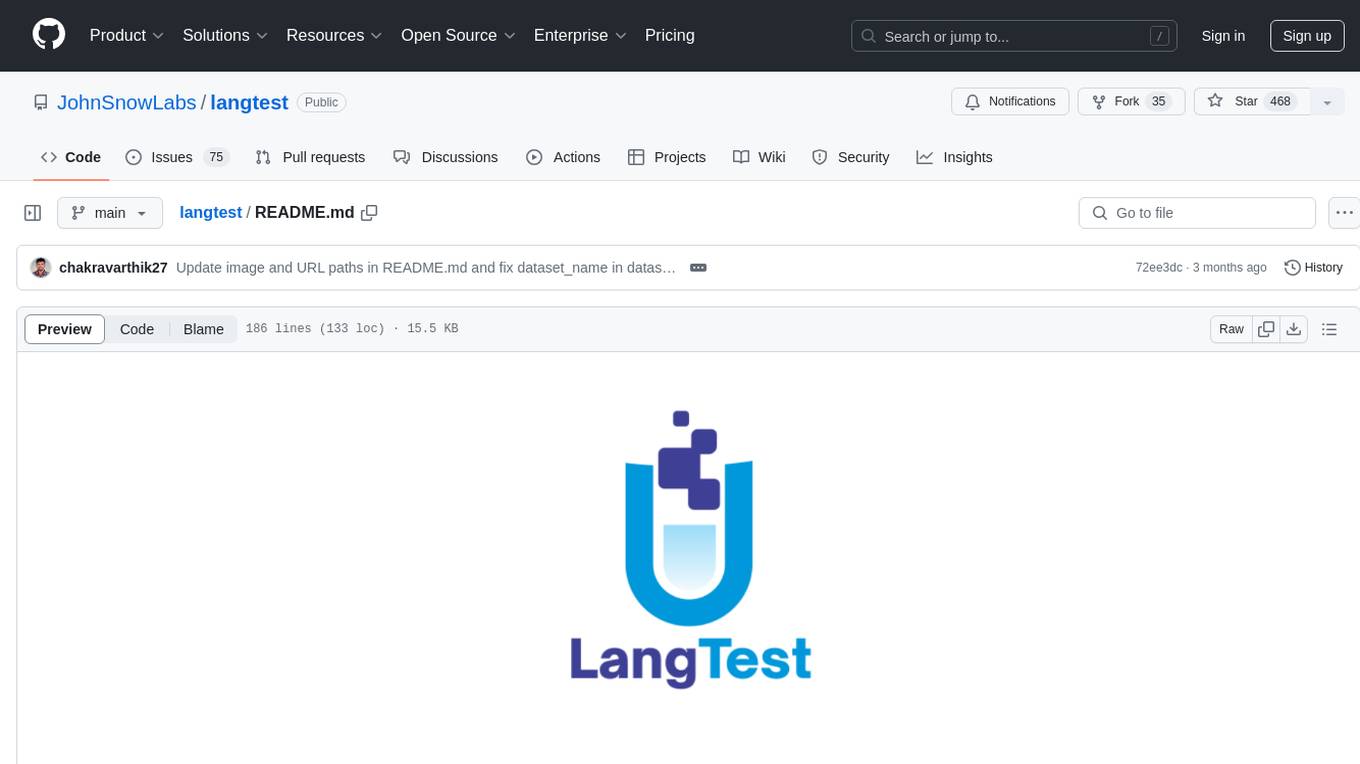
langtest
LangTest is a comprehensive evaluation library for custom LLM and NLP models. It aims to deliver safe and effective language models by providing tools to test model quality, augment training data, and support popular NLP frameworks. LangTest comes with benchmark datasets to challenge and enhance language models, ensuring peak performance in various linguistic tasks. The tool offers more than 60 distinct types of tests with just one line of code, covering aspects like robustness, bias, representation, fairness, and accuracy. It supports testing LLMS for question answering, toxicity, clinical tests, legal support, factuality, sycophancy, and summarization.
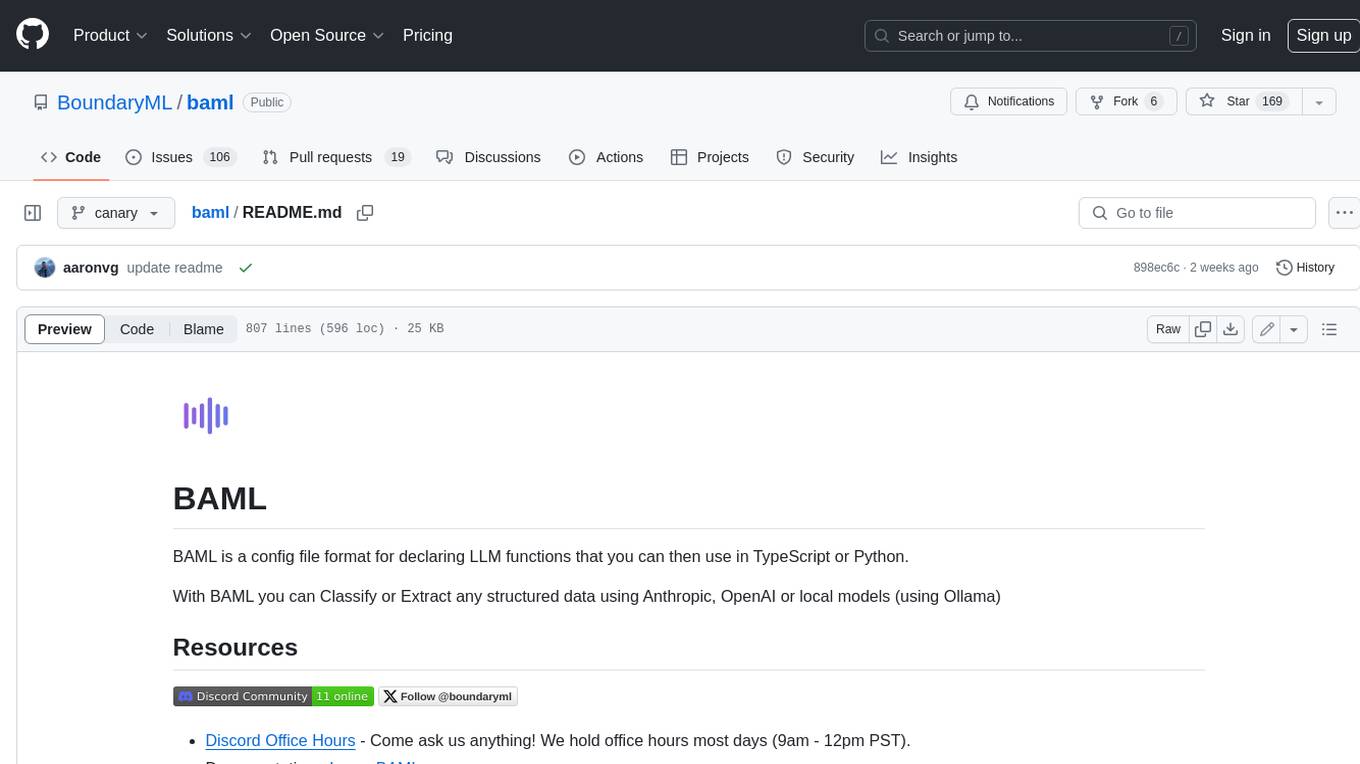
baml
BAML is a config file format for declaring LLM functions that you can then use in TypeScript or Python. With BAML you can Classify or Extract any structured data using Anthropic, OpenAI or local models (using Ollama) ## Resources  [Discord Community](https://discord.gg/boundaryml)  [Follow us on Twitter](https://twitter.com/boundaryml) * Discord Office Hours - Come ask us anything! We hold office hours most days (9am - 12pm PST). * Documentation - Learn BAML * Documentation - BAML Syntax Reference * Documentation - Prompt engineering tips * Boundary Studio - Observability and more #### Starter projects * BAML + NextJS 14 * BAML + FastAPI + Streaming ## Motivation Calling LLMs in your code is frustrating: * your code uses types everywhere: classes, enums, and arrays * but LLMs speak English, not types BAML makes calling LLMs easy by taking a type-first approach that lives fully in your codebase: 1. Define what your LLM output type is in a .baml file, with rich syntax to describe any field (even enum values) 2. Declare your prompt in the .baml config using those types 3. Add additional LLM config like retries or redundancy 4. Transpile the .baml files to a callable Python or TS function with a type-safe interface. (VSCode extension does this for you automatically). We were inspired by similar patterns for type safety: protobuf and OpenAPI for RPCs, Prisma and SQLAlchemy for databases. BAML guarantees type safety for LLMs and comes with tools to give you a great developer experience:  Jump to BAML code or how Flexible Parsing works without additional LLM calls. | BAML Tooling | Capabilities | | ----------------------------------------------------------------------------------------- | ---------------------------------------------------------------------------------------------------------------------------------------------------------------------------------------------------------------------------------------------------------------------------------------------------------------------------------- | | BAML Compiler install | Transpiles BAML code to a native Python / Typescript library (you only need it for development, never for releases) Works on Mac, Windows, Linux  | | VSCode Extension install | Syntax highlighting for BAML files Real-time prompt preview Testing UI | | Boundary Studio open (not open source) | Type-safe observability Labeling |
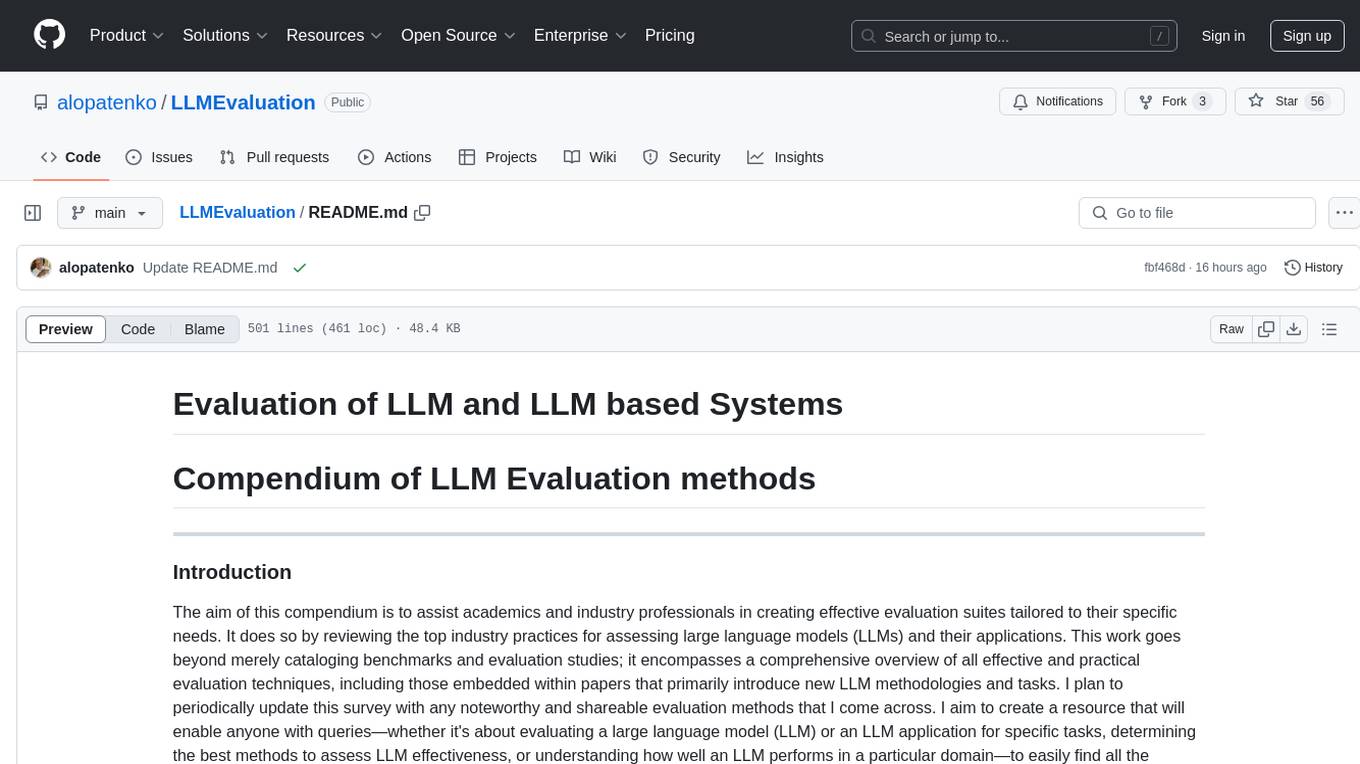
LLMEvaluation
The LLMEvaluation repository is a comprehensive compendium of evaluation methods for Large Language Models (LLMs) and LLM-based systems. It aims to assist academics and industry professionals in creating effective evaluation suites tailored to their specific needs by reviewing industry practices for assessing LLMs and their applications. The repository covers a wide range of evaluation techniques, benchmarks, and studies related to LLMs, including areas such as embeddings, question answering, multi-turn dialogues, reasoning, multi-lingual tasks, ethical AI, biases, safe AI, code generation, summarization, software performance, agent LLM architectures, long text generation, graph understanding, and various unclassified tasks. It also includes evaluations for LLM systems in conversational systems, copilots, search and recommendation engines, task utility, and verticals like healthcare, law, science, financial, and others. The repository provides a wealth of resources for evaluating and understanding the capabilities of LLMs in different domains.
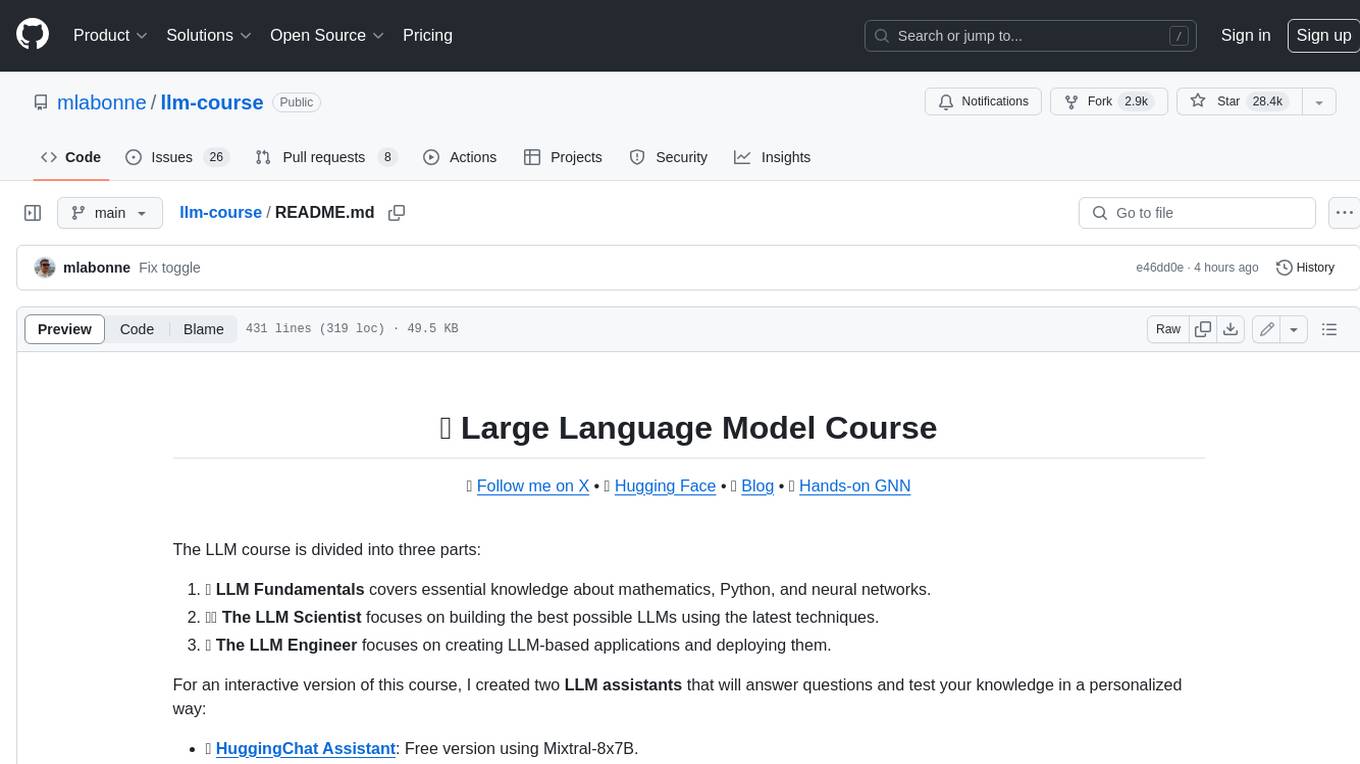
llm-course
The LLM course is divided into three parts: 1. 🧩 **LLM Fundamentals** covers essential knowledge about mathematics, Python, and neural networks. 2. 🧑🔬 **The LLM Scientist** focuses on building the best possible LLMs using the latest techniques. 3. 👷 **The LLM Engineer** focuses on creating LLM-based applications and deploying them. For an interactive version of this course, I created two **LLM assistants** that will answer questions and test your knowledge in a personalized way: * 🤗 **HuggingChat Assistant**: Free version using Mixtral-8x7B. * 🤖 **ChatGPT Assistant**: Requires a premium account. ## 📝 Notebooks A list of notebooks and articles related to large language models. ### Tools | Notebook | Description | Notebook | |----------|-------------|----------| | 🧐 LLM AutoEval | Automatically evaluate your LLMs using RunPod |  | | 🥱 LazyMergekit | Easily merge models using MergeKit in one click. |  | | 🦎 LazyAxolotl | Fine-tune models in the cloud using Axolotl in one click. |  | | ⚡ AutoQuant | Quantize LLMs in GGUF, GPTQ, EXL2, AWQ, and HQQ formats in one click. |  | | 🌳 Model Family Tree | Visualize the family tree of merged models. |  | | 🚀 ZeroSpace | Automatically create a Gradio chat interface using a free ZeroGPU. |  |

LLM-PowerHouse-A-Curated-Guide-for-Large-Language-Models-with-Custom-Training-and-Inferencing
LLM-PowerHouse is a comprehensive and curated guide designed to empower developers, researchers, and enthusiasts to harness the true capabilities of Large Language Models (LLMs) and build intelligent applications that push the boundaries of natural language understanding. This GitHub repository provides in-depth articles, codebase mastery, LLM PlayLab, and resources for cost analysis and network visualization. It covers various aspects of LLMs, including NLP, models, training, evaluation metrics, open LLMs, and more. The repository also includes a collection of code examples and tutorials to help users build and deploy LLM-based applications.
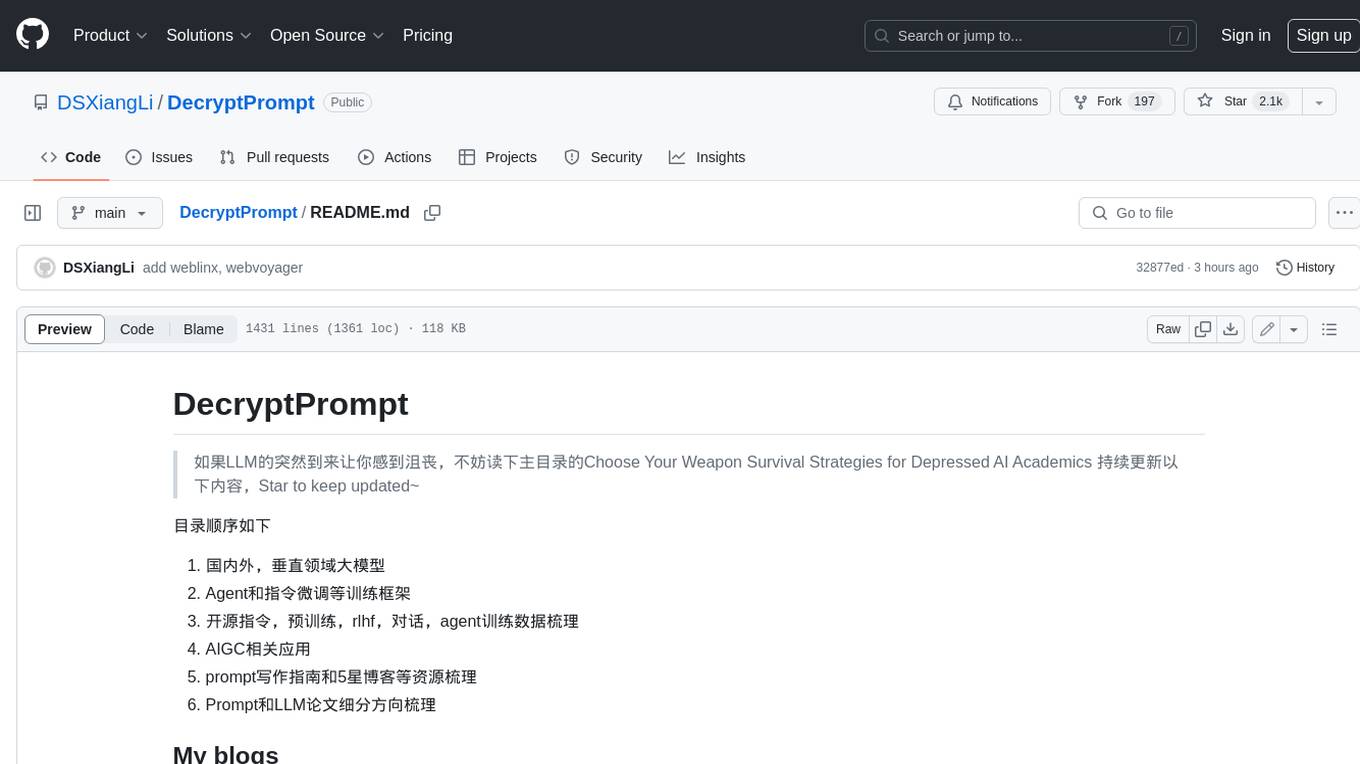
DecryptPrompt
This repository does not provide a tool, but rather a collection of resources and strategies for academics in the field of artificial intelligence who are feeling depressed or overwhelmed by the rapid advancements in the field. The resources include articles, blog posts, and other materials that offer advice on how to cope with the challenges of working in a fast-paced and competitive environment.
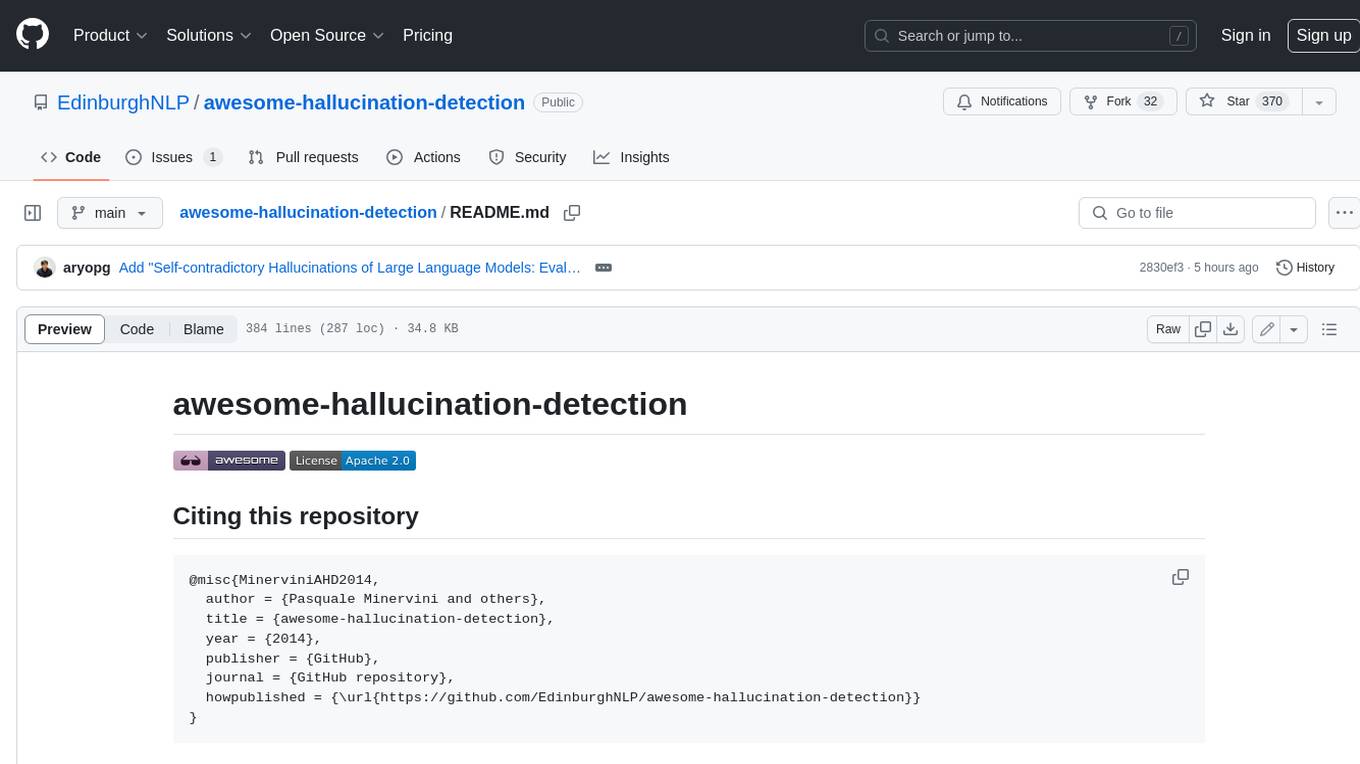
awesome-hallucination-detection
This repository provides a curated list of papers, datasets, and resources related to the detection and mitigation of hallucinations in large language models (LLMs). Hallucinations refer to the generation of factually incorrect or nonsensical text by LLMs, which can be a significant challenge for their use in real-world applications. The resources in this repository aim to help researchers and practitioners better understand and address this issue.
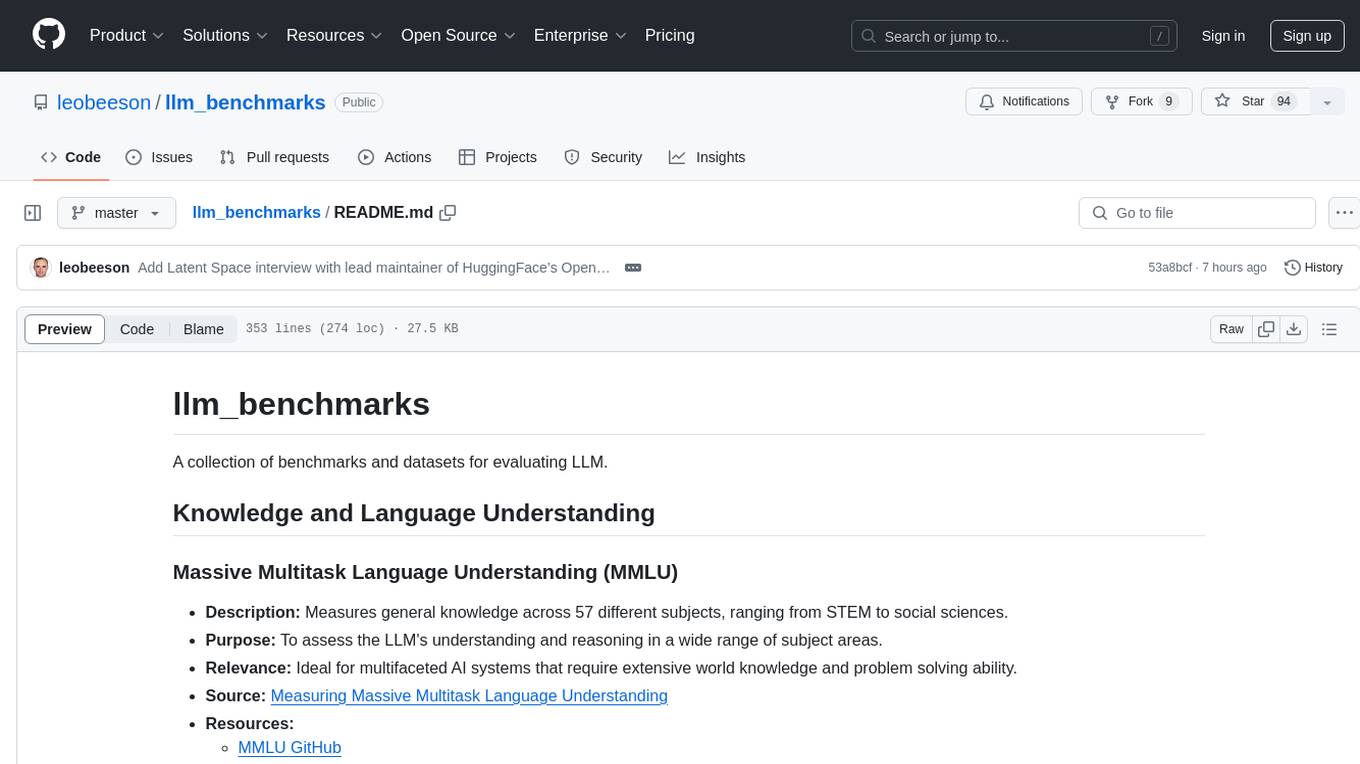
llm_benchmarks
llm_benchmarks is a collection of benchmarks and datasets for evaluating Large Language Models (LLMs). It includes various tasks and datasets to assess LLMs' knowledge, reasoning, language understanding, and conversational abilities. The repository aims to provide comprehensive evaluation resources for LLMs across different domains and applications, such as education, healthcare, content moderation, coding, and conversational AI. Researchers and developers can leverage these benchmarks to test and improve the performance of LLMs in various real-world scenarios.
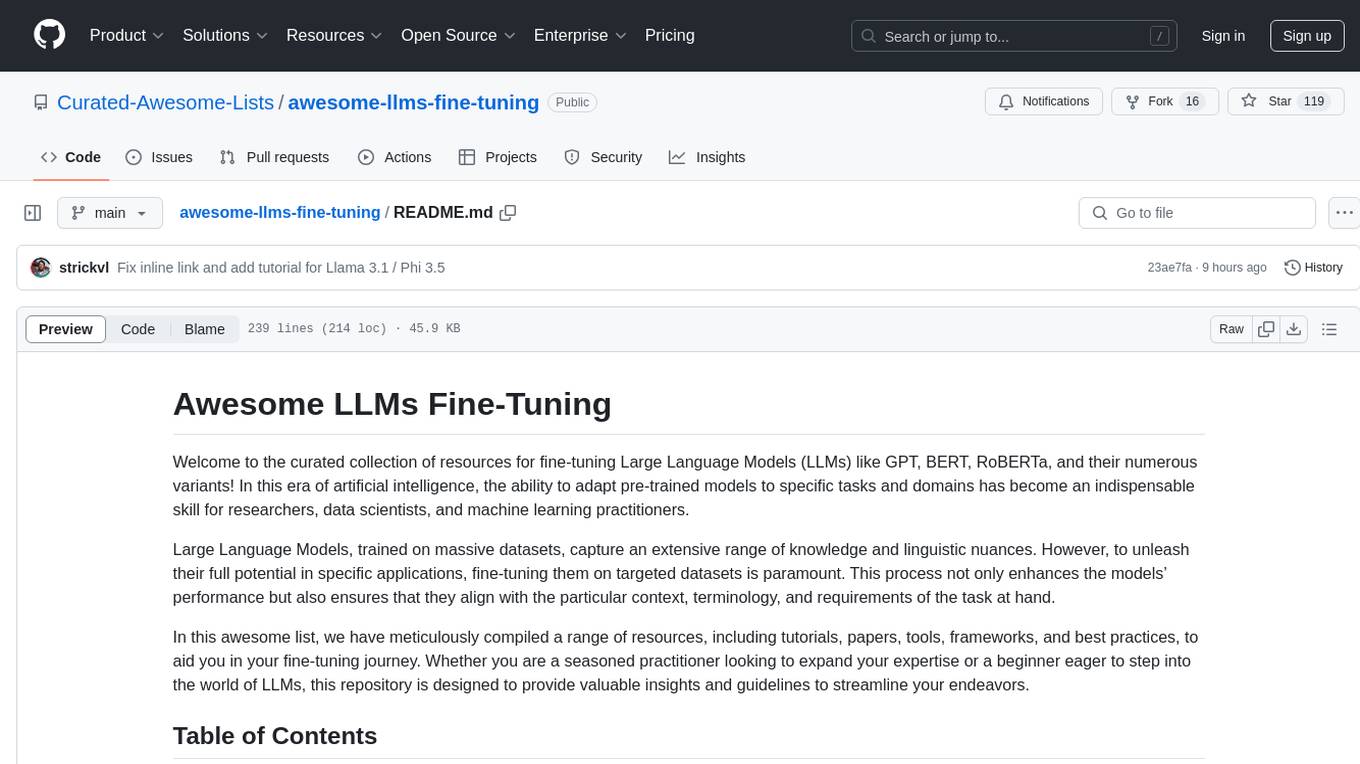
awesome-llms-fine-tuning
This repository is a curated collection of resources for fine-tuning Large Language Models (LLMs) like GPT, BERT, RoBERTa, and their variants. It includes tutorials, papers, tools, frameworks, and best practices to aid researchers, data scientists, and machine learning practitioners in adapting pre-trained models to specific tasks and domains. The resources cover a wide range of topics related to fine-tuning LLMs, providing valuable insights and guidelines to streamline the process and enhance model performance.
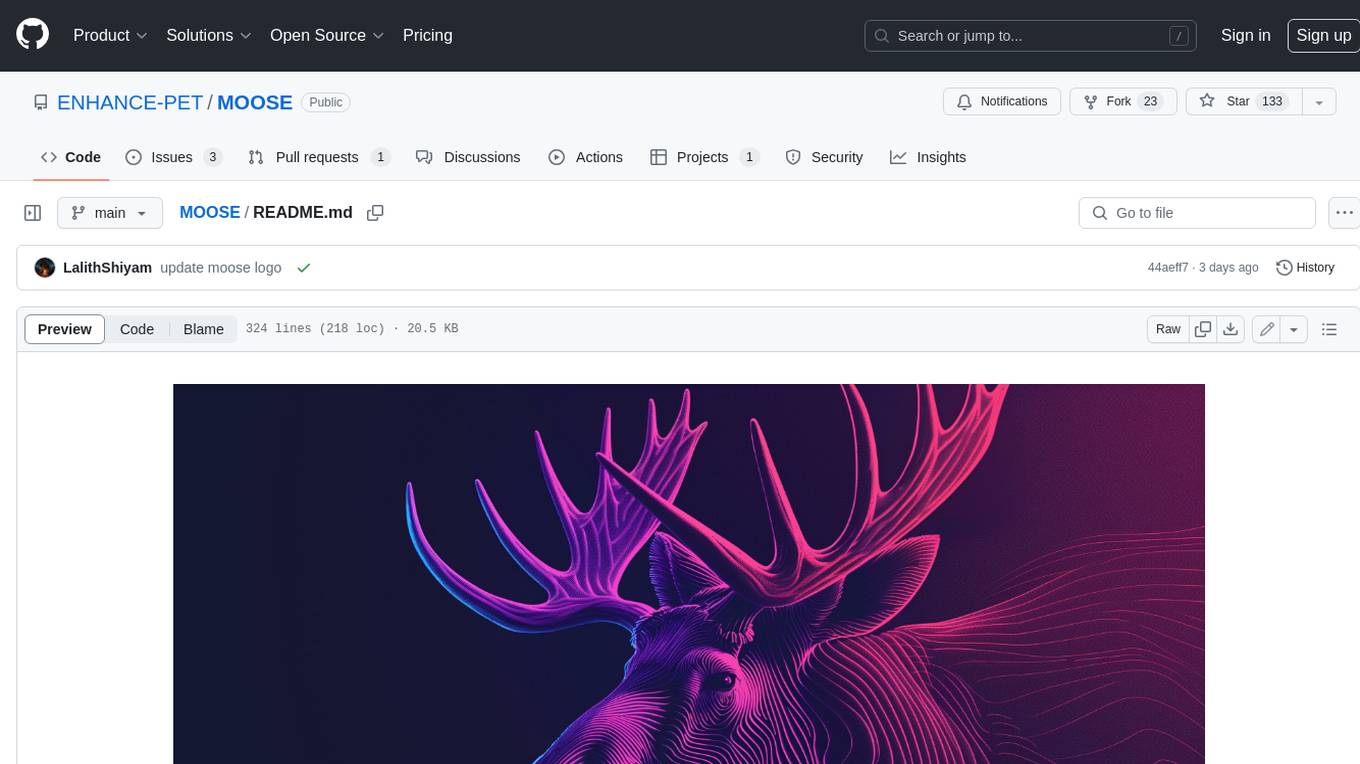
MOOSE
MOOSE 2.0 is a leaner, meaner, and stronger tool for 3D medical image segmentation. It is built on the principles of data-centric AI and offers a wide range of segmentation models for both clinical and preclinical settings. MOOSE 2.0 is also versatile, allowing users to use it as a command-line tool for batch processing or as a library package for individual processing in Python projects. With its improved speed, accuracy, and flexibility, MOOSE 2.0 is the go-to tool for segmentation tasks.
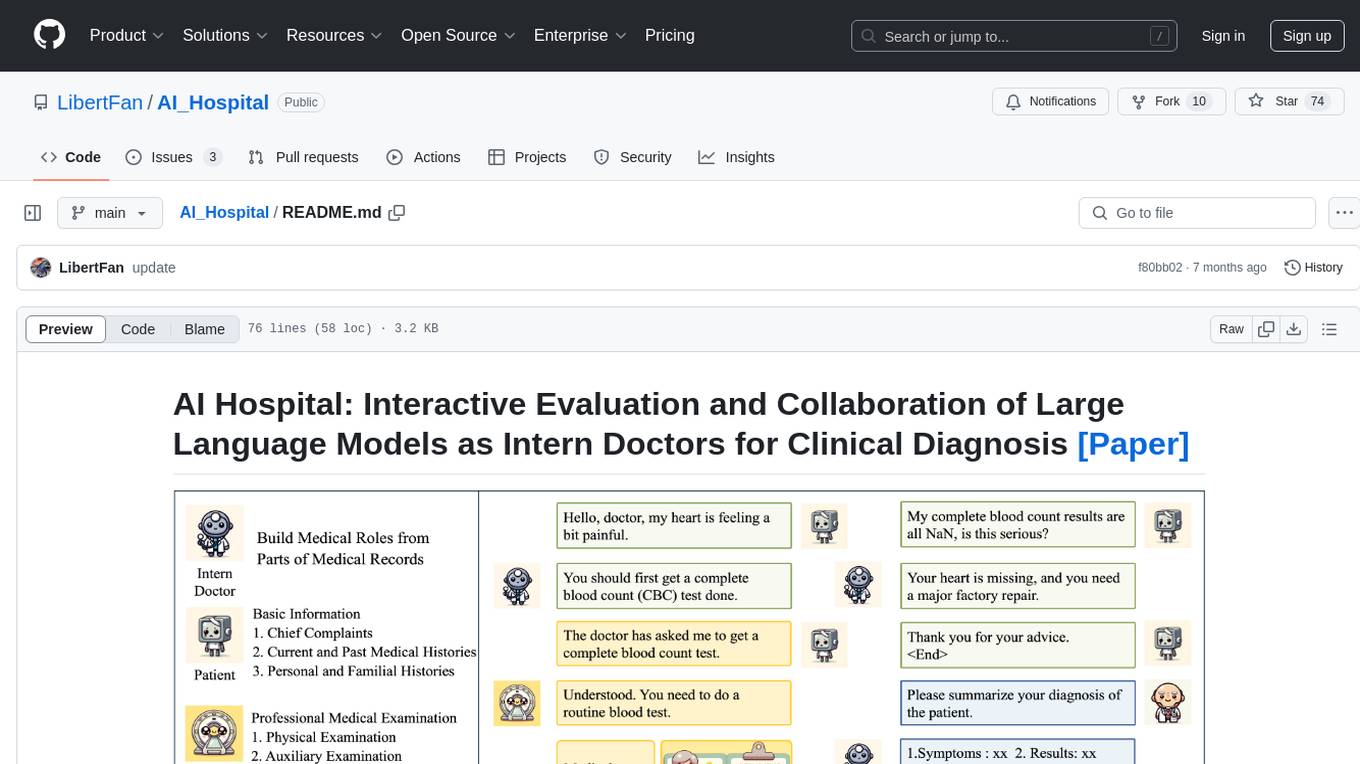
AI_Hospital
AI Hospital is a research repository focusing on the interactive evaluation and collaboration of Large Language Models (LLMs) as intern doctors for clinical diagnosis. The repository includes a simulation module tailored for various medical roles, introduces the Multi-View Medical Evaluation (MVME) Benchmark, provides dialog history documents of LLMs, replication instructions, performance evaluation, and guidance for creating intern doctor agents. The collaborative diagnosis with LLMs emphasizes dispute resolution. The study was authored by Zhihao Fan, Jialong Tang, Wei Chen, Siyuan Wang, Zhongyu Wei, Jun Xie, Fei Huang, and Jingren Zhou.
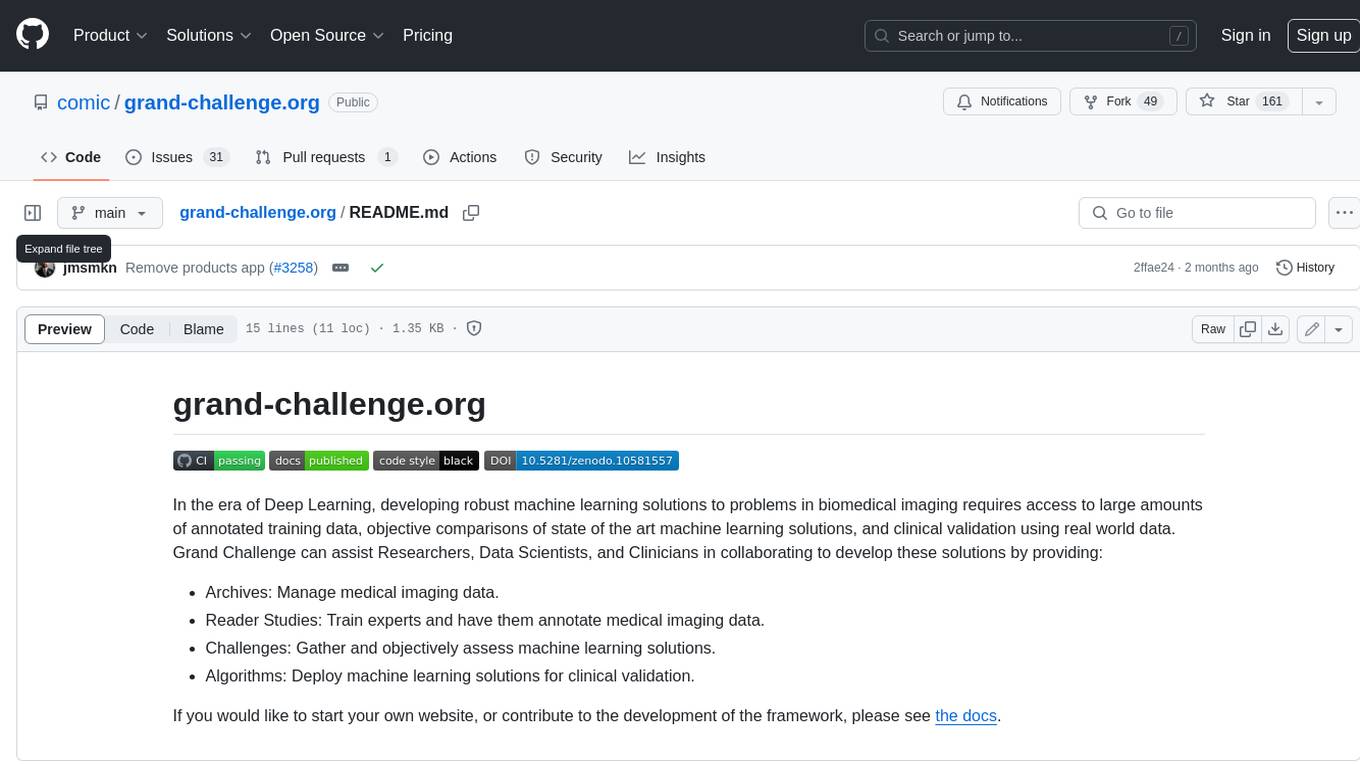
grand-challenge.org
Grand Challenge is a platform that provides access to large amounts of annotated training data, objective comparisons of state-of-the-art machine learning solutions, and clinical validation using real-world data. It assists researchers, data scientists, and clinicians in collaborating to develop robust machine learning solutions to problems in biomedical imaging.
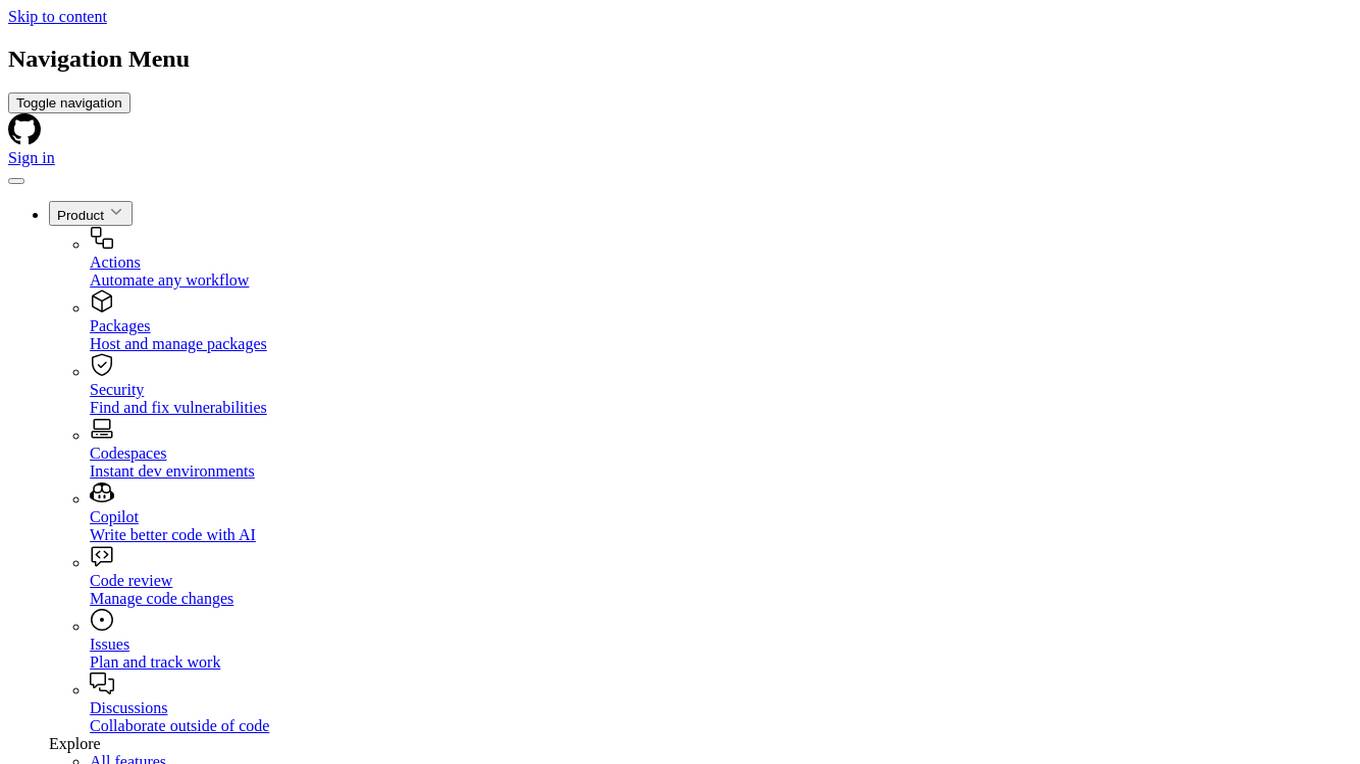
cyclops
Cyclops is a toolkit for facilitating research and deployment of ML models for healthcare. It provides a few high-level APIs namely: data - Create datasets for training, inference and evaluation. We use the popular 🤗 datasets to efficiently load and slice different modalities of data models - Use common model implementations using scikit-learn and PyTorch tasks - Use common ML task formulations such as binary classification or multi-label classification on tabular, time-series and image data evaluate - Evaluate models on clinical prediction tasks monitor - Detect dataset shift relevant for clinical use cases report - Create model report cards for clinical ML models

Open-Medical-Reasoning-Tasks
Open Life Science AI: Medical Reasoning Tasks is a collaborative hub for developing cutting-edge reasoning tasks for Large Language Models (LLMs) in the medical, healthcare, and clinical domains. The repository aims to advance AI capabilities in healthcare by fostering accurate diagnoses, personalized treatments, and improved patient outcomes. It offers a diverse range of medical reasoning challenges such as Diagnostic Reasoning, Treatment Planning, Medical Image Analysis, Clinical Data Interpretation, Patient History Analysis, Ethical Decision Making, Medical Literature Comprehension, and Drug Interaction Assessment. Contributors can join the community of healthcare professionals, AI researchers, and enthusiasts to contribute to the repository by creating new tasks or improvements following the provided guidelines. The repository also provides resources including a task list, evaluation metrics, medical AI papers, and healthcare datasets for training and evaluation.
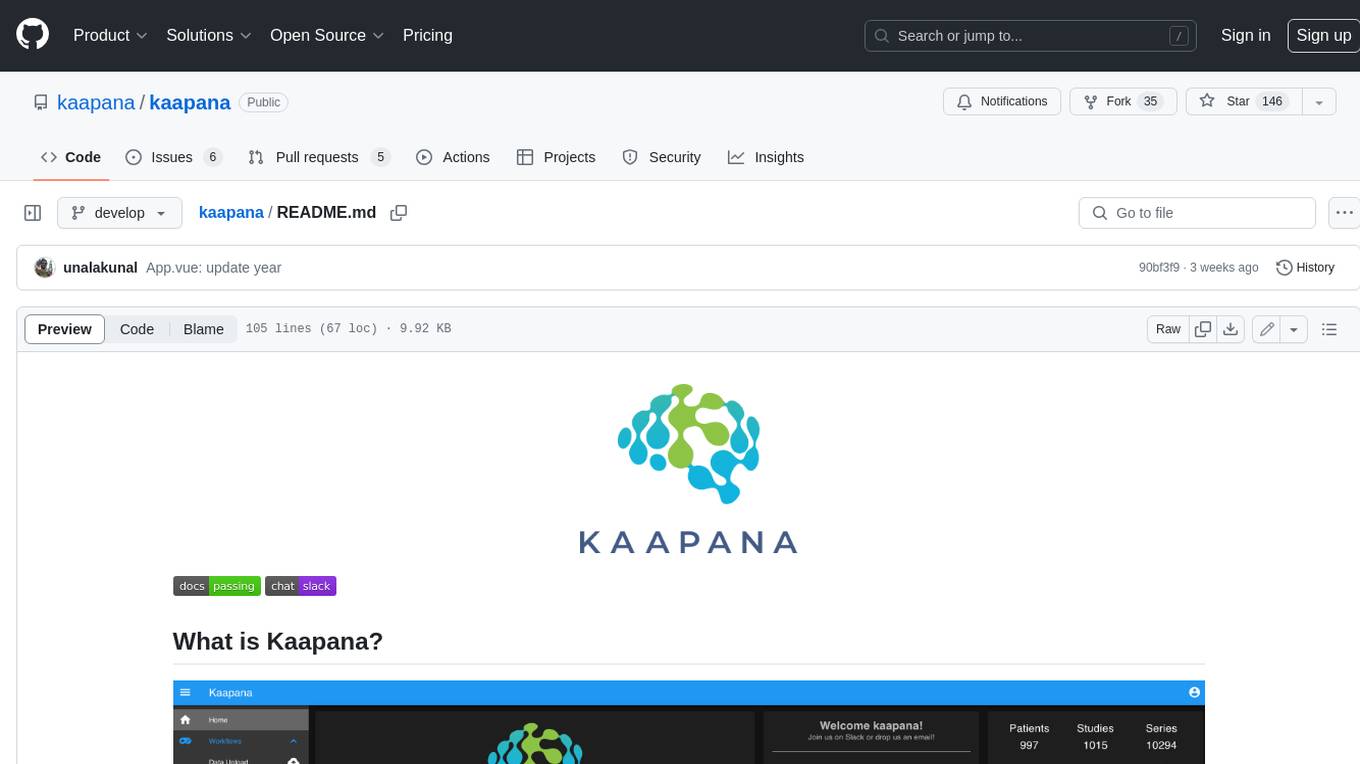
kaapana
Kaapana is an open-source toolkit for state-of-the-art platform provisioning in the field of medical data analysis. The applications comprise AI-based workflows and federated learning scenarios with a focus on radiological and radiotherapeutic imaging. Obtaining large amounts of medical data necessary for developing and training modern machine learning methods is an extremely challenging effort that often fails in a multi-center setting, e.g. due to technical, organizational and legal hurdles. A federated approach where the data remains under the authority of the individual institutions and is only processed on-site is, in contrast, a promising approach ideally suited to overcome these difficulties. Following this federated concept, the goal of Kaapana is to provide a framework and a set of tools for sharing data processing algorithms, for standardized workflow design and execution as well as for performing distributed method development. This will facilitate data analysis in a compliant way enabling researchers and clinicians to perform large-scale multi-center studies. By adhering to established standards and by adopting widely used open technologies for private cloud development and containerized data processing, Kaapana integrates seamlessly with the existing clinical IT infrastructure, such as the Picture Archiving and Communication System (PACS), and ensures modularity and easy extensibility.
20 - OpenAI Gpts
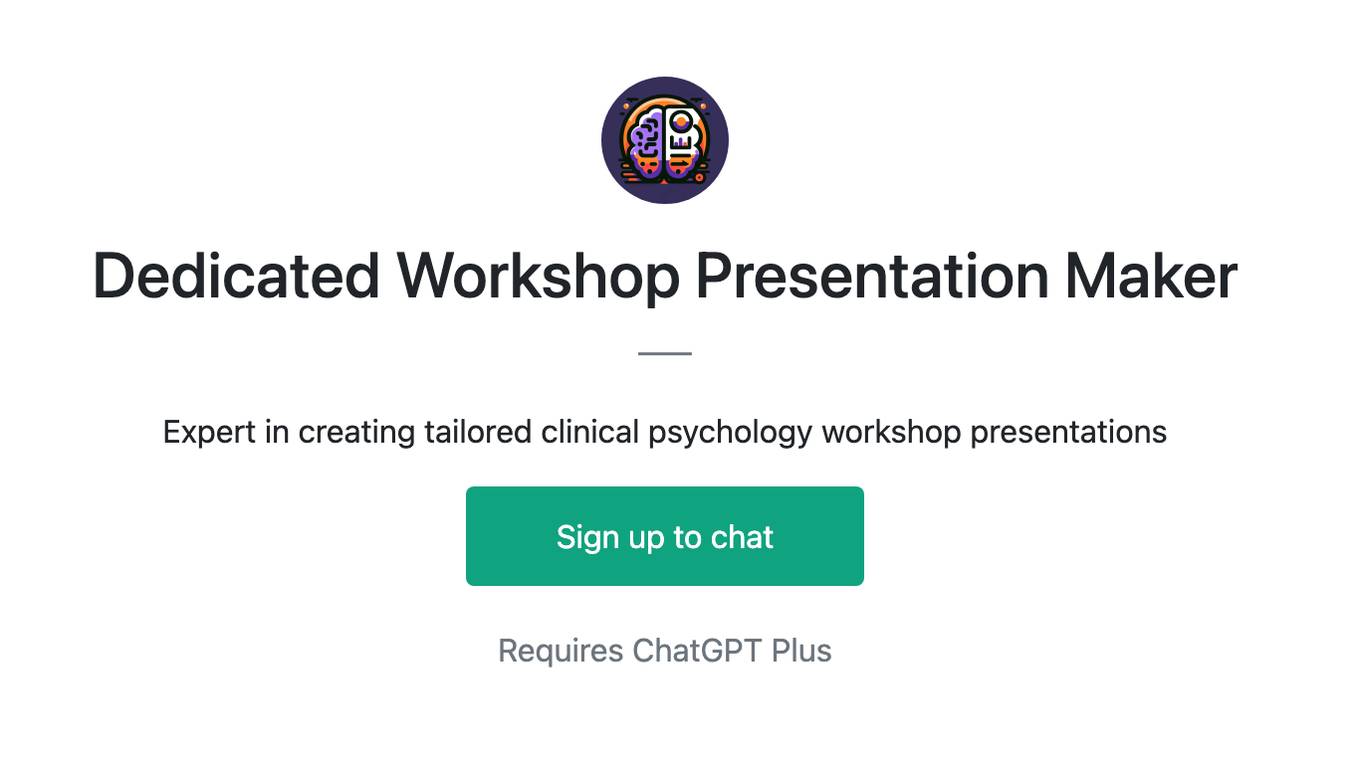
Dedicated Workshop Presentation Maker
Expert in creating tailored clinical psychology workshop presentations
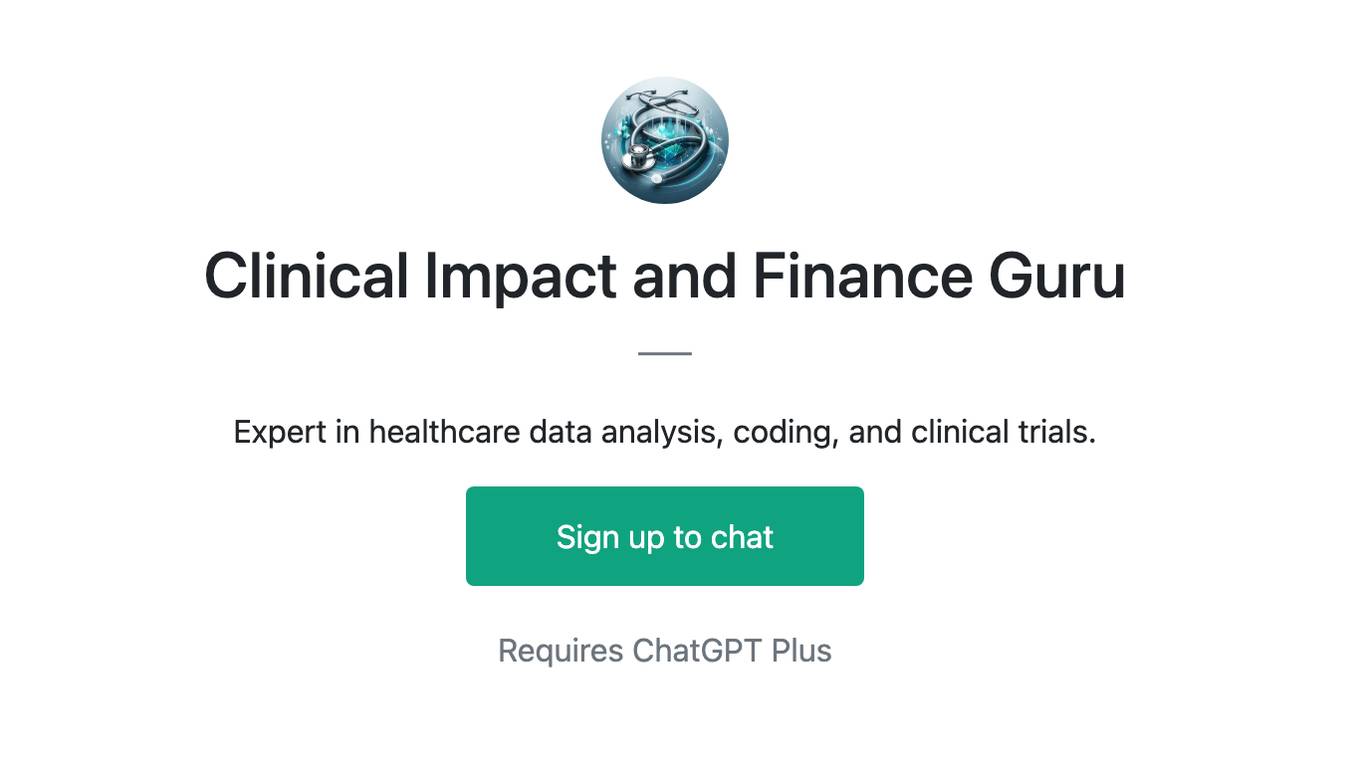
Clinical Impact and Finance Guru
Expert in healthcare data analysis, coding, and clinical trials.
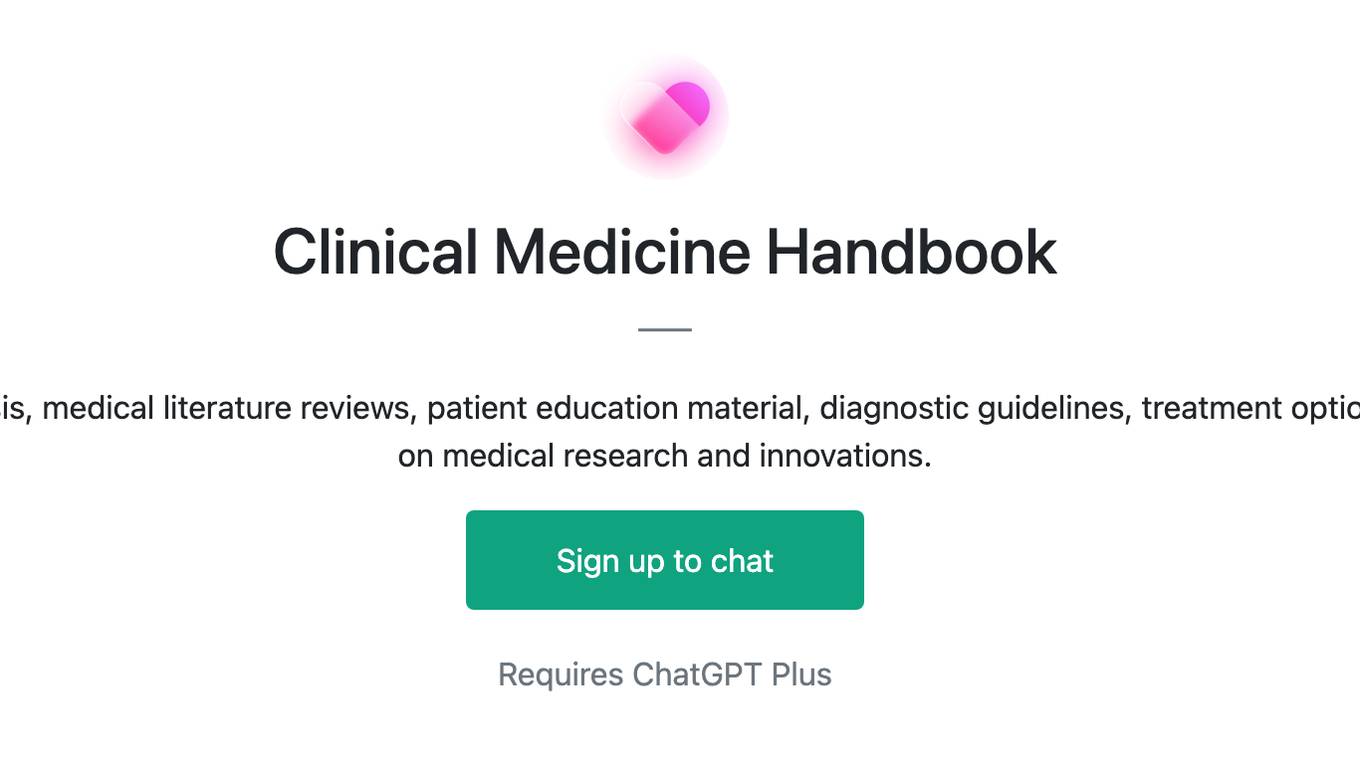
Clinical Medicine Handbook
I can assist doctors with information synthesis, medical literature reviews, patient education material, diagnostic guidelines, treatment options, ethical dilemmas, and staying updated on medical research and innovations.
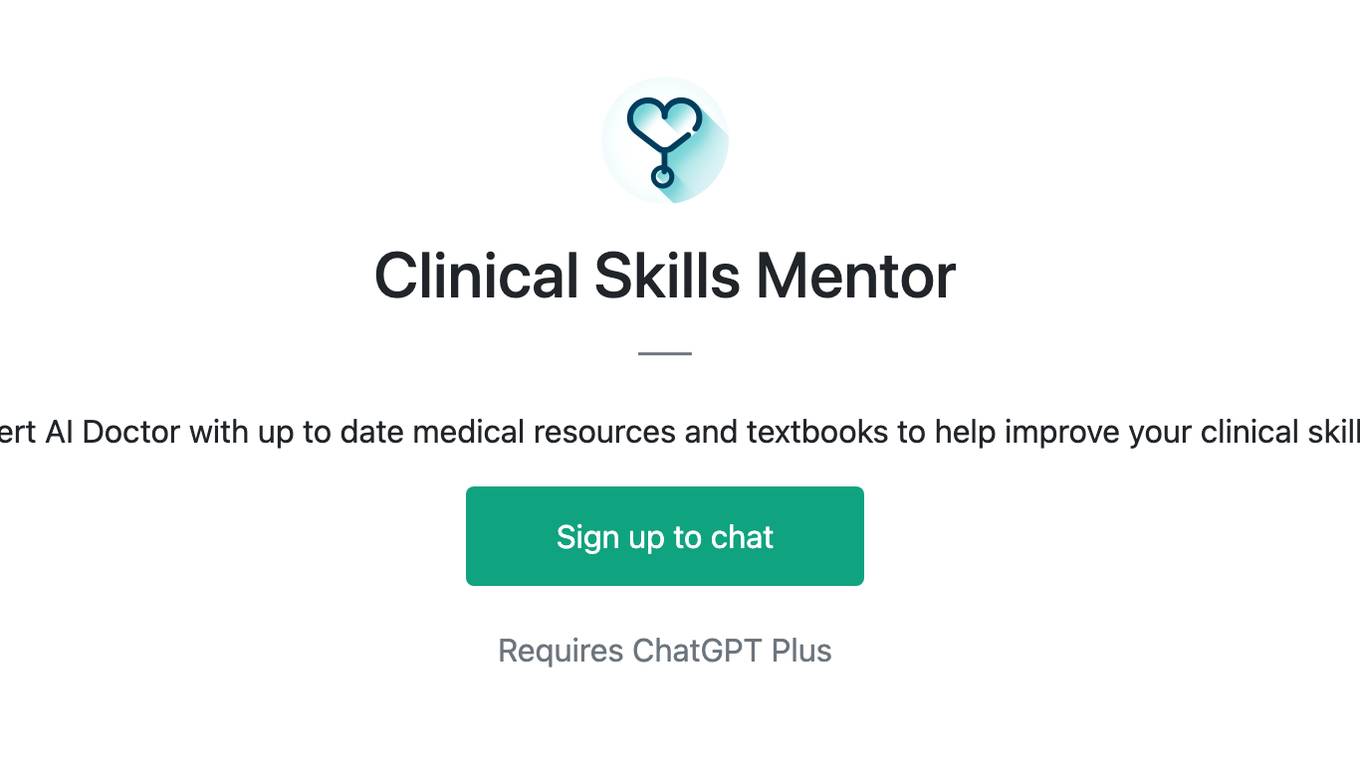
Clinical Skills Mentor
Expert AI Doctor with up to date medical resources and textbooks to help improve your clinical skills.
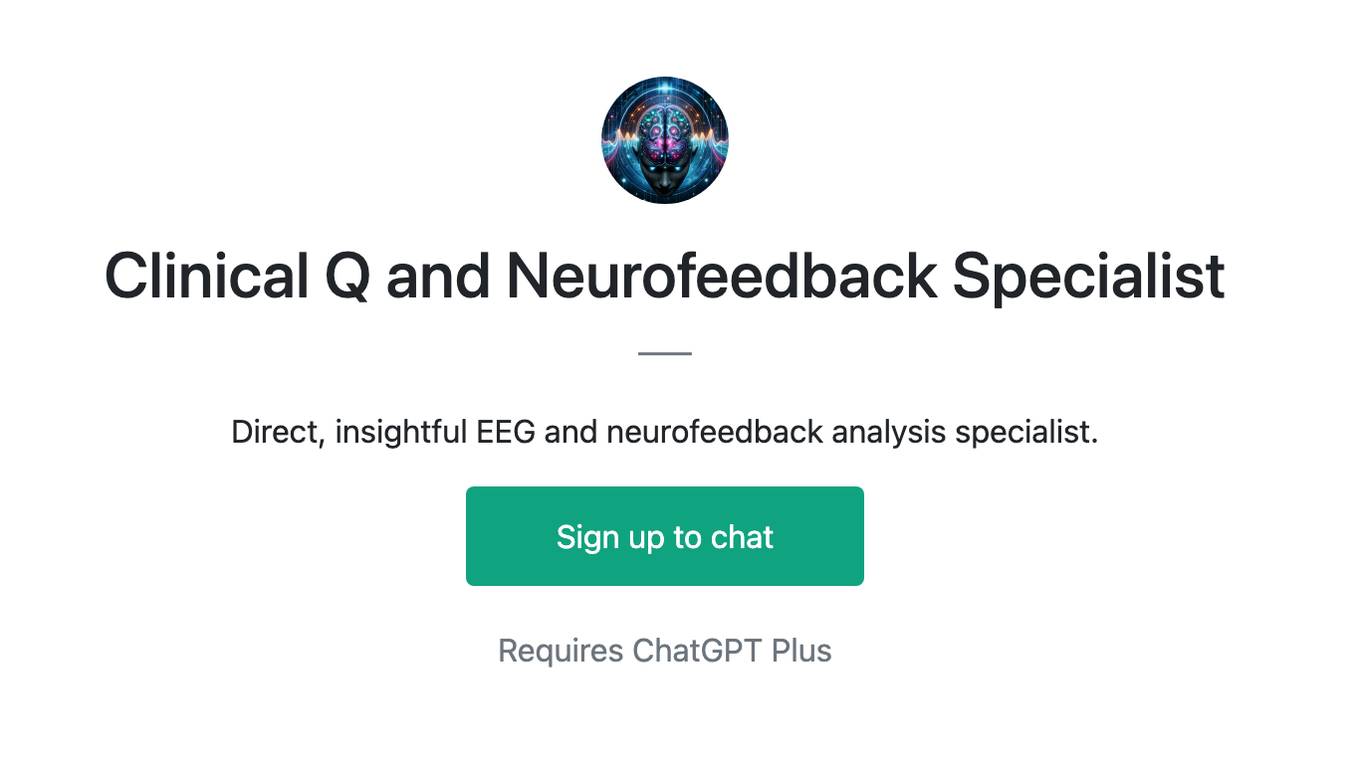
Clinical Q and Neurofeedback Specialist
Direct, insightful EEG and neurofeedback analysis specialist.
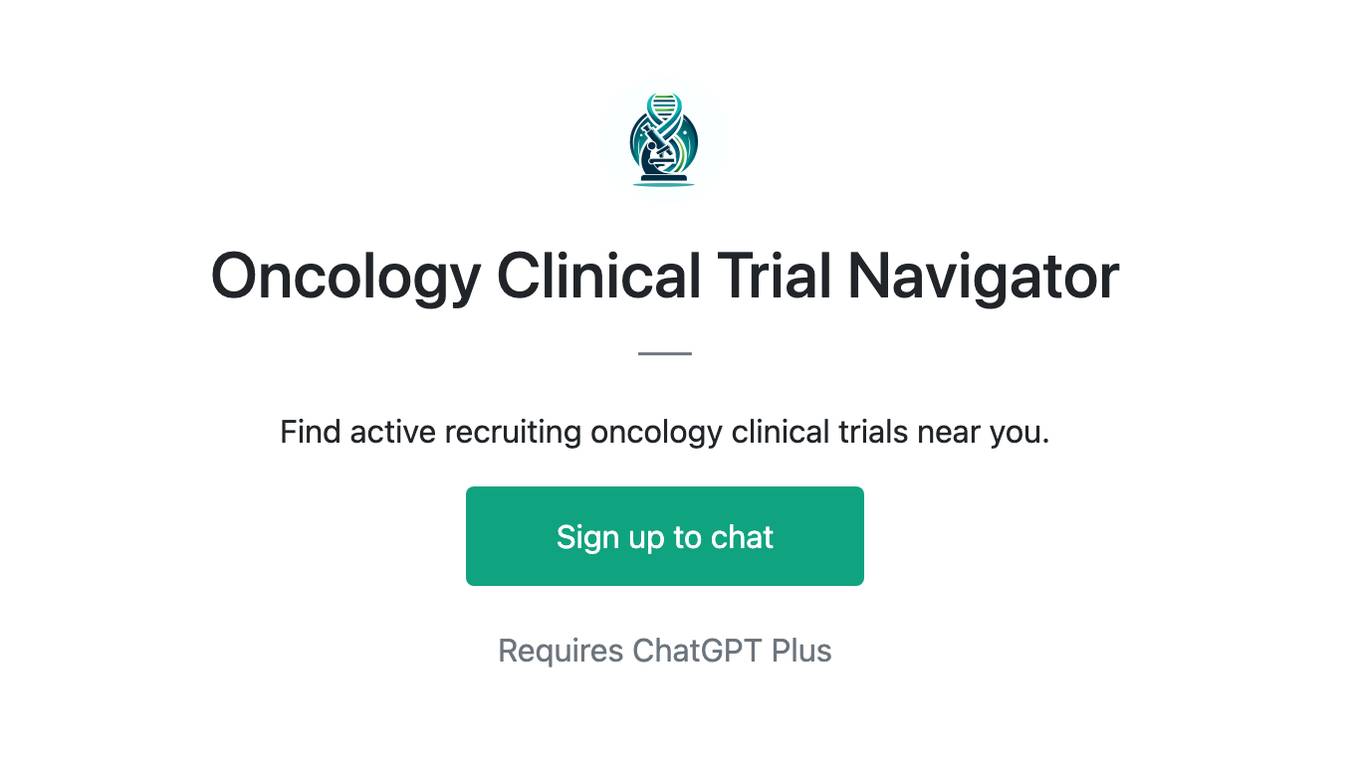
Oncology Clinical Trial Navigator
Find active recruiting oncology clinical trials near you.
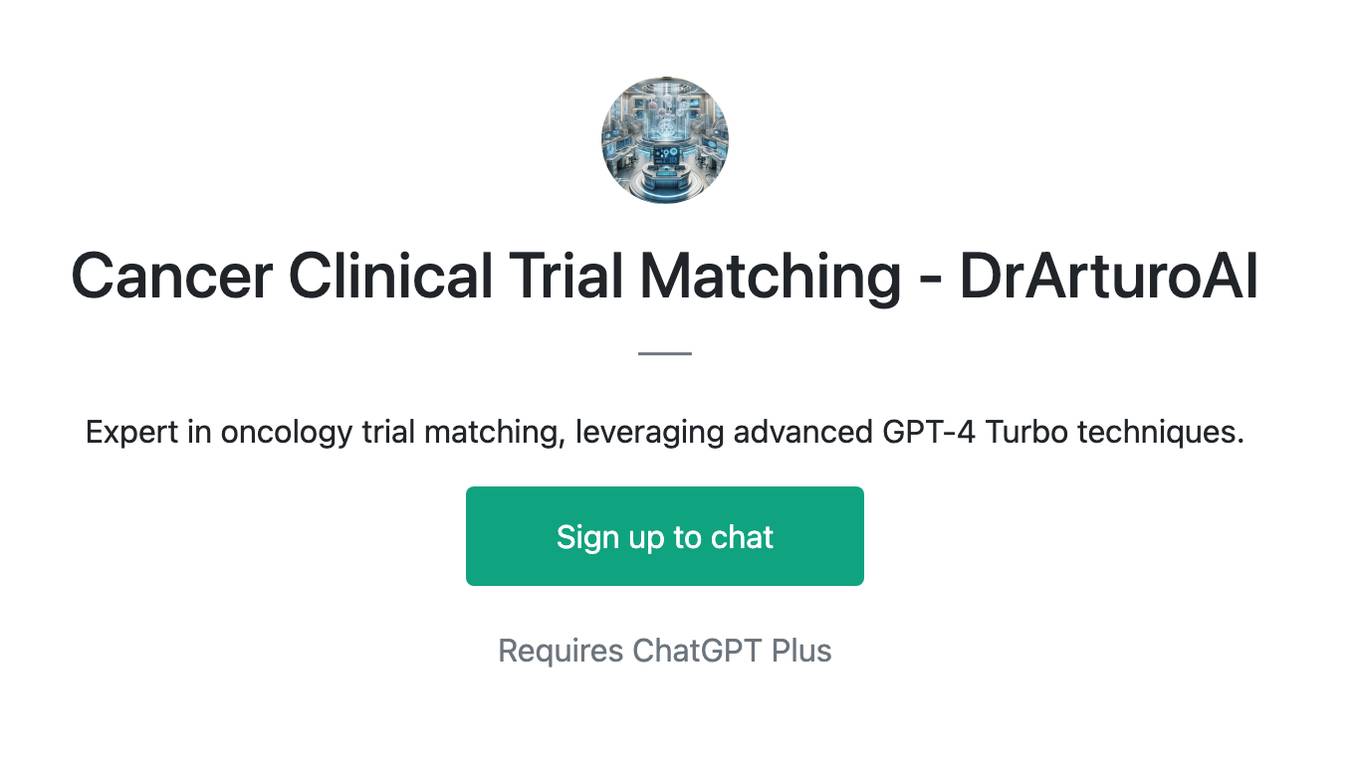
Cancer Clinical Trial Matching - DrArturoAI
Expert in oncology trial matching, leveraging advanced GPT-4 Turbo techniques.
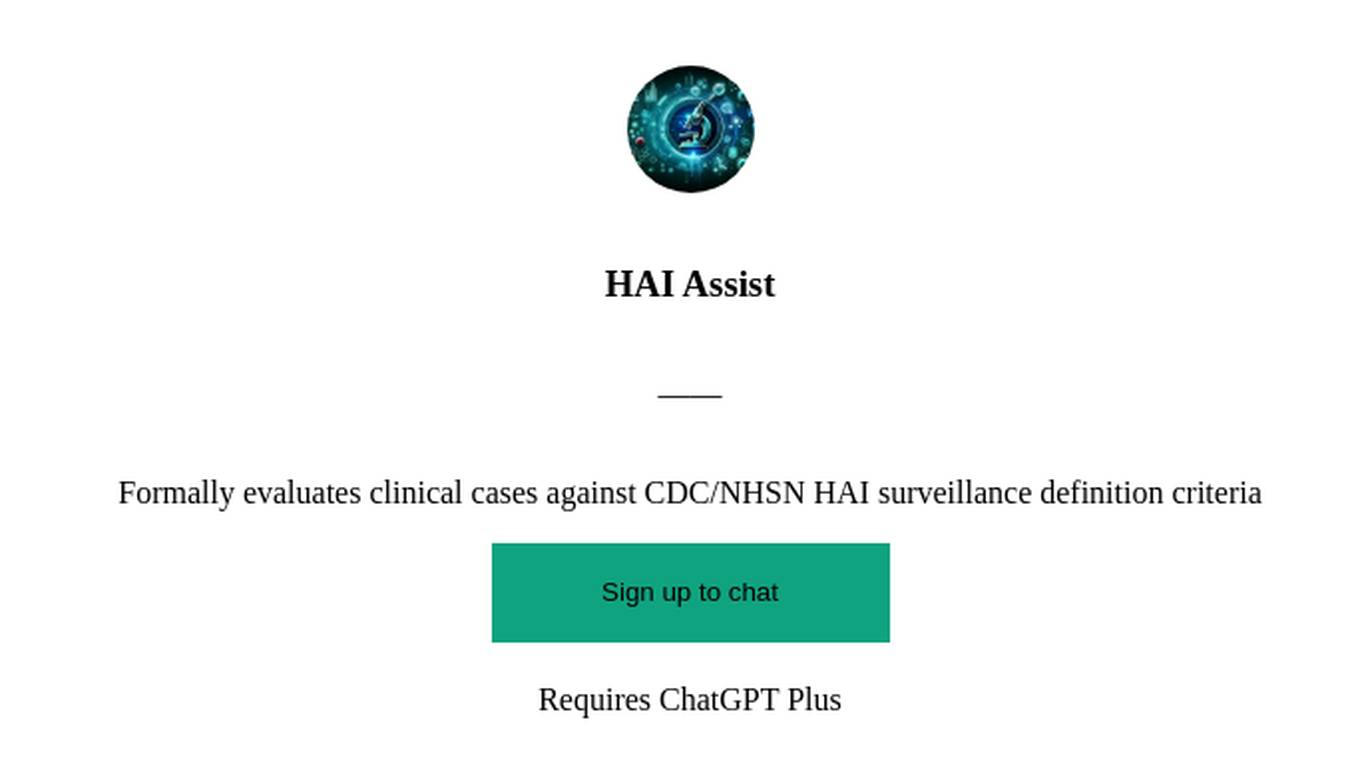
HAI Assist
Formally evaluates clinical cases against CDC/NHSN HAI surveillance definition criteria
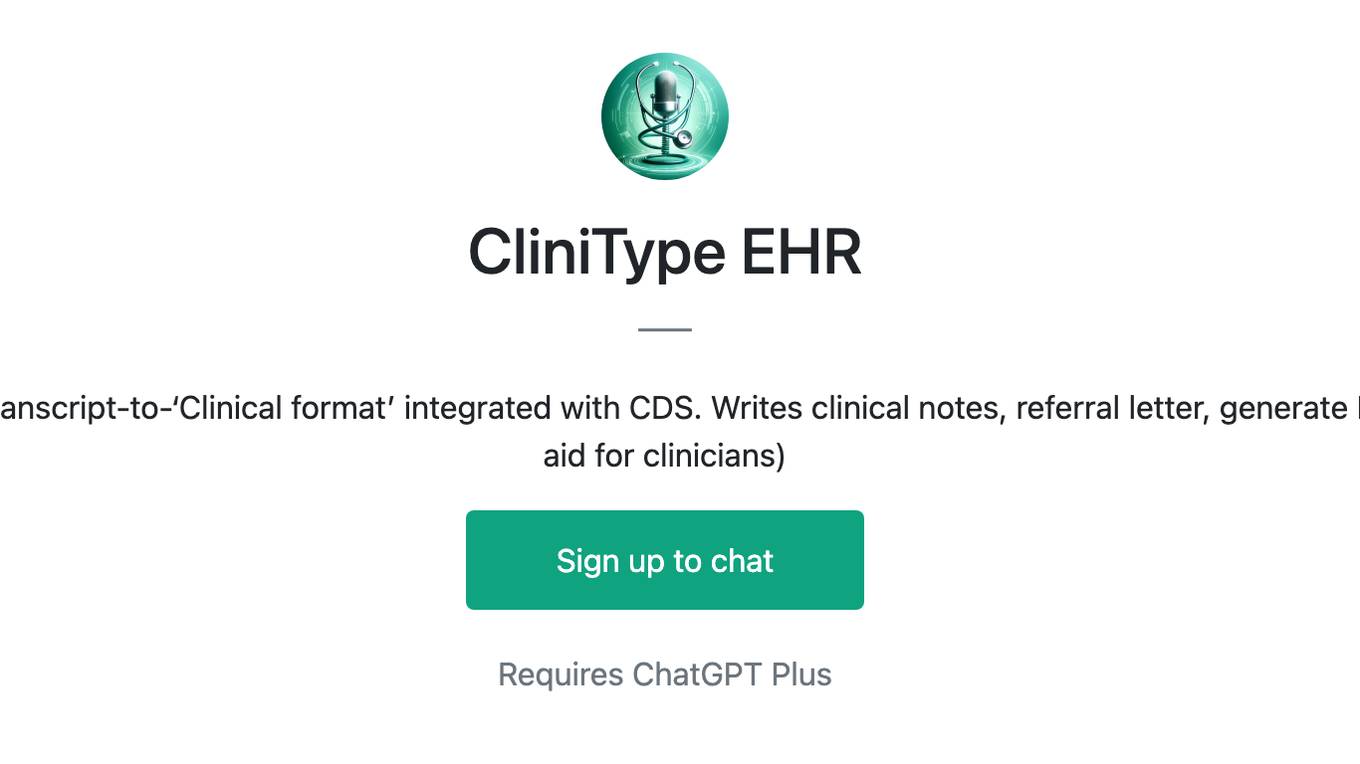
CliniType EHR
Voice-to-text, Vision-to-text transcription, Transcript-to-‘Clinical format’ integrated with CDS. Writes clinical notes, referral letter, generate PDF,prepare discharge summary. (Ultimate aid for clinicians)
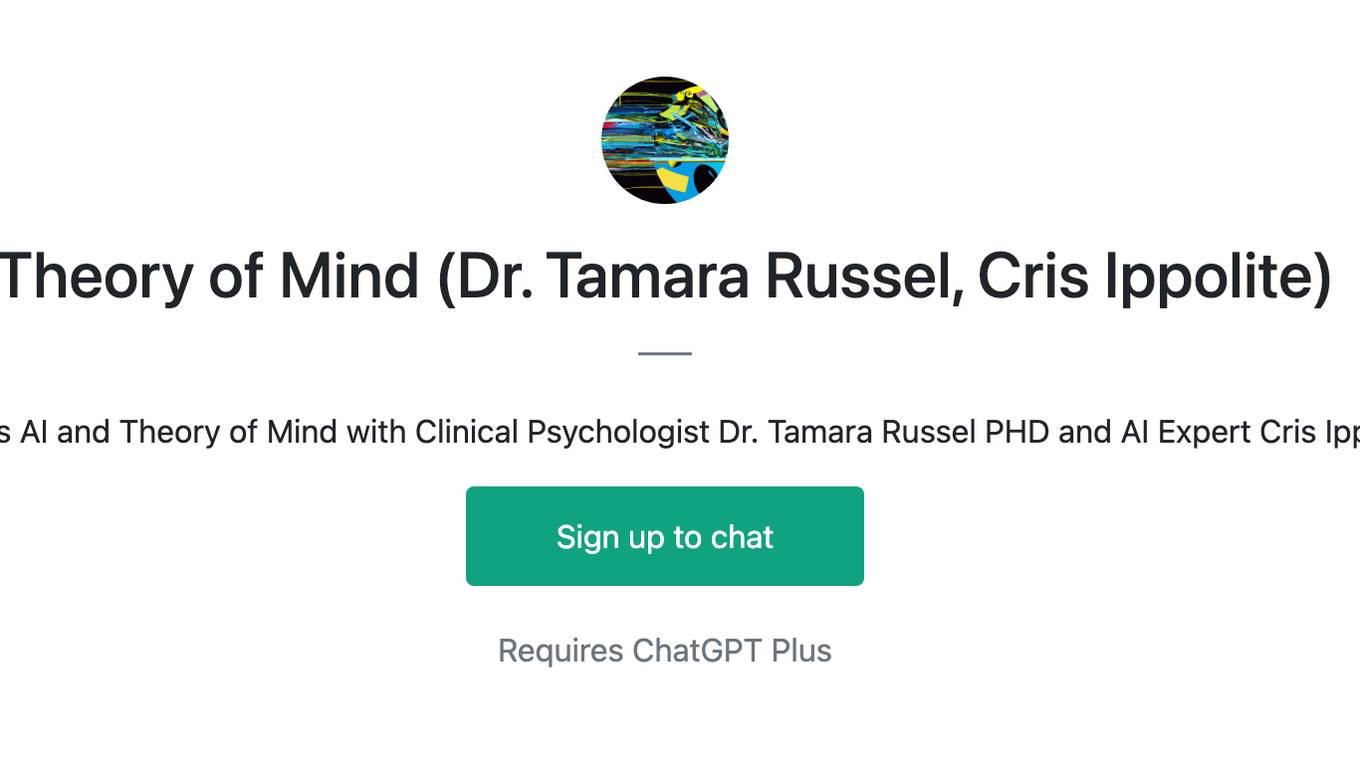
Theory of Mind (Dr. Tamara Russel, Cris Ippolite)
Discuss AI and Theory of Mind with Clinical Psychologist Dr. Tamara Russel PHD and AI Expert Cris Ippolite
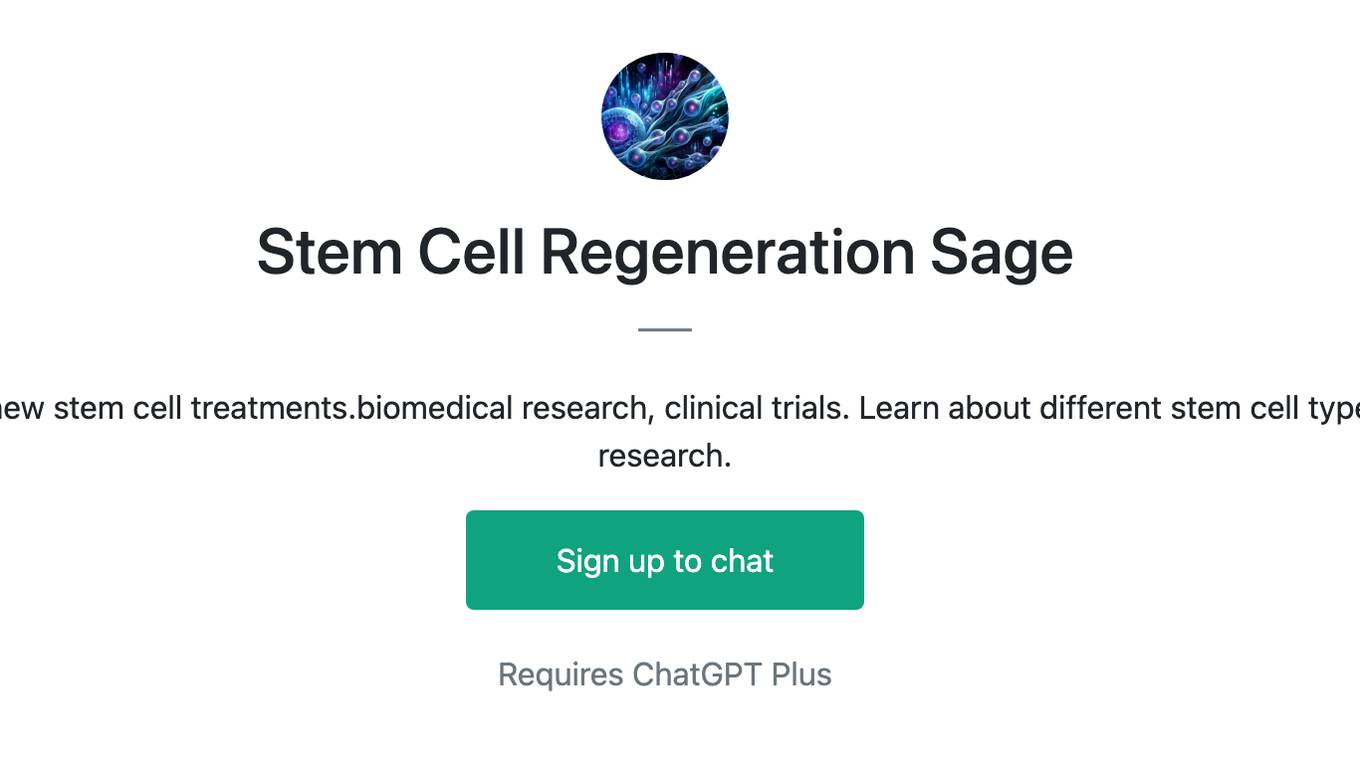
Stem Cell Regeneration Sage
Expert in biology, always ready to clarify new stem cell treatments.biomedical research, clinical trials. Learn about different stem cell types, current/future uses, and the latest in research.
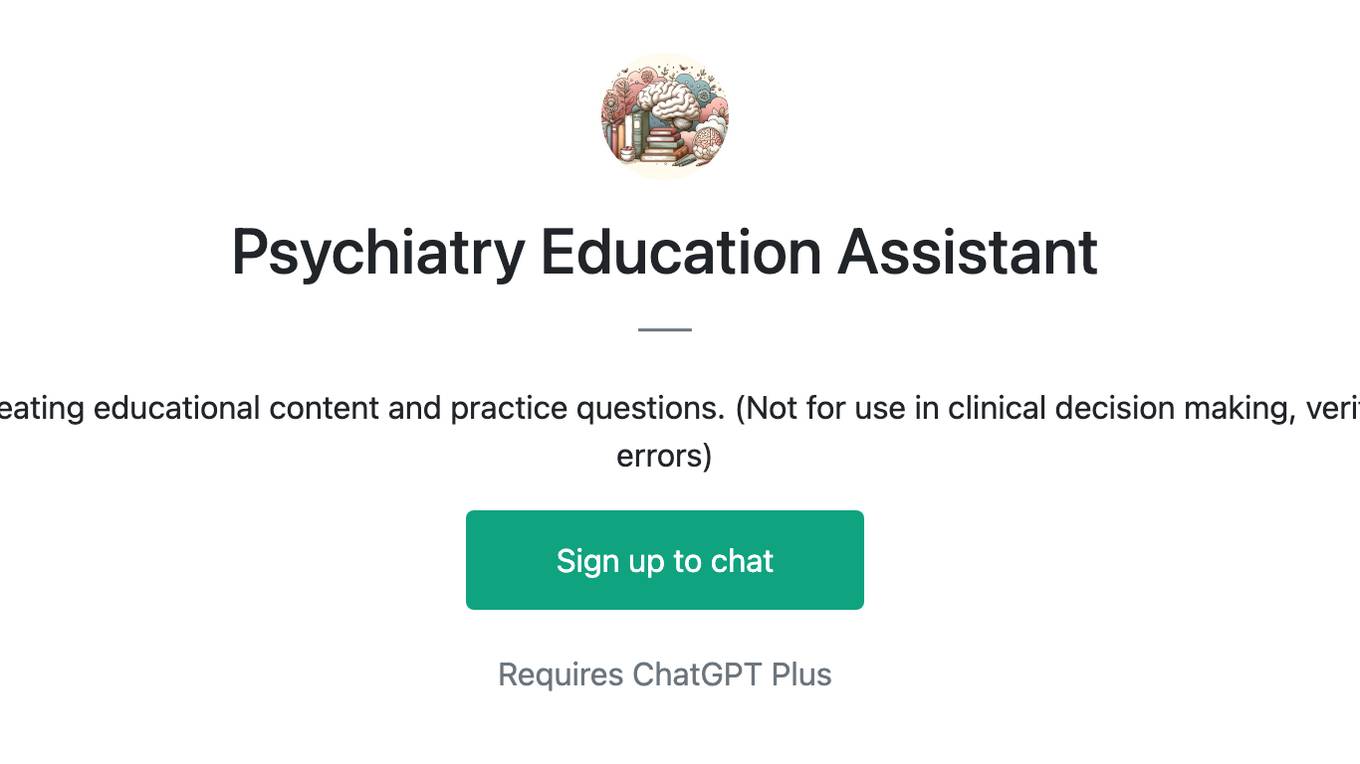
Psychiatry Education Assistant
An academic assistant for psychiatrists, creating educational content and practice questions. (Not for use in clinical decision making, verify all information, as model may produce errors)
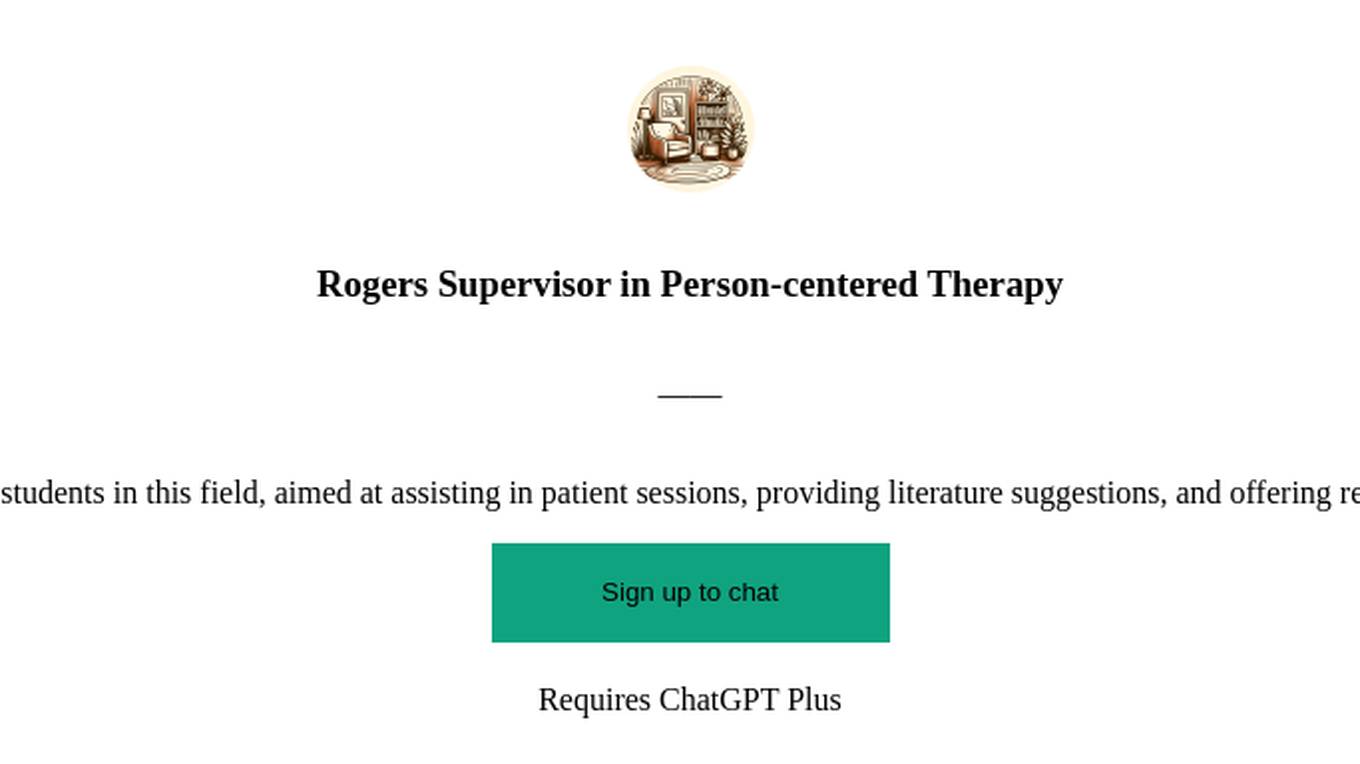
Rogers Supervisor in Person-centered Therapy
A guide for Therapists in Person-centered or students in this field, aimed at assisting in patient sessions, providing literature suggestions, and offering reflections on the clinical interventions of users.
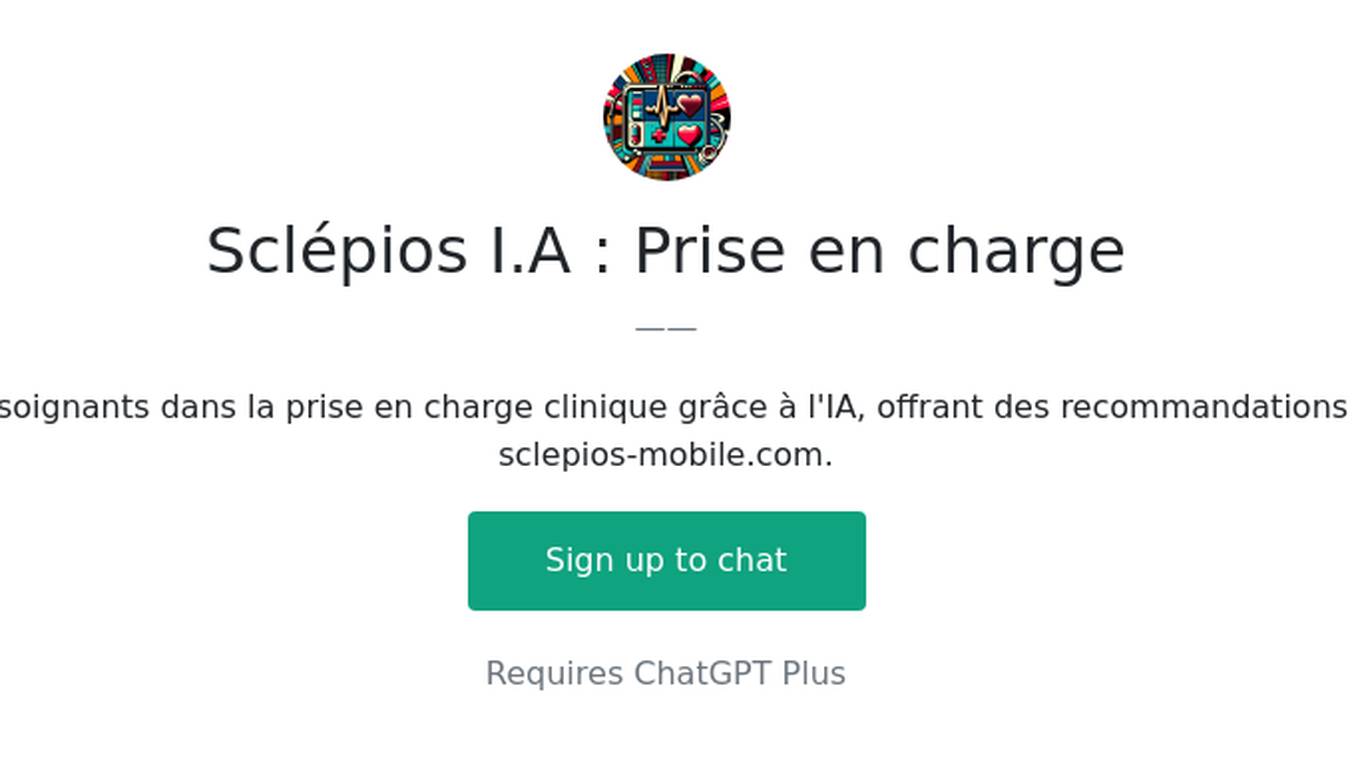
Sclépios I.A : Prise en charge
Le GPT custom de Sclépios IA guide les soignants dans la prise en charge clinique grâce à l'IA, offrant des recommandations précises en un instant. Plus d'infos sur sclepios-mobile.com.

